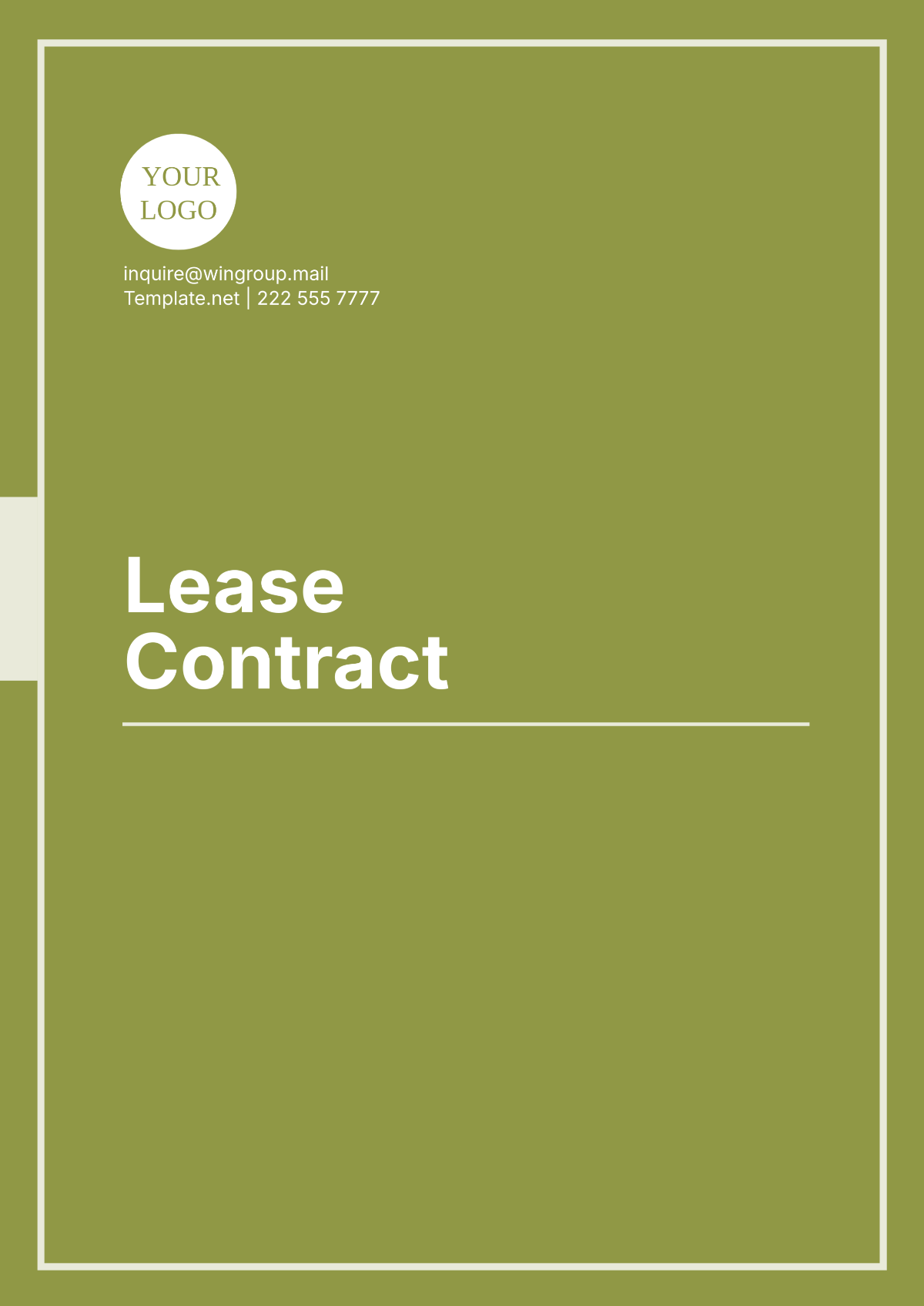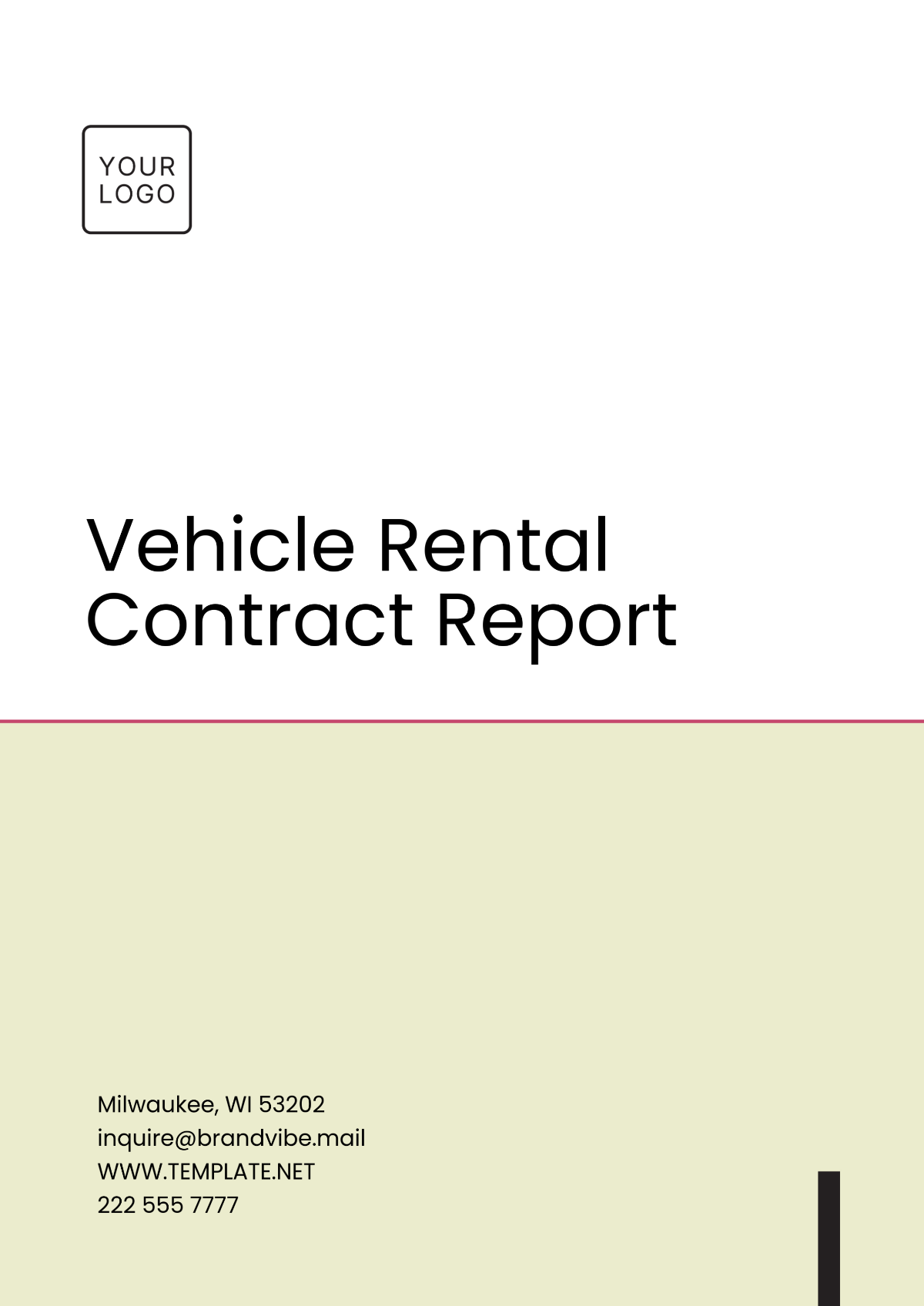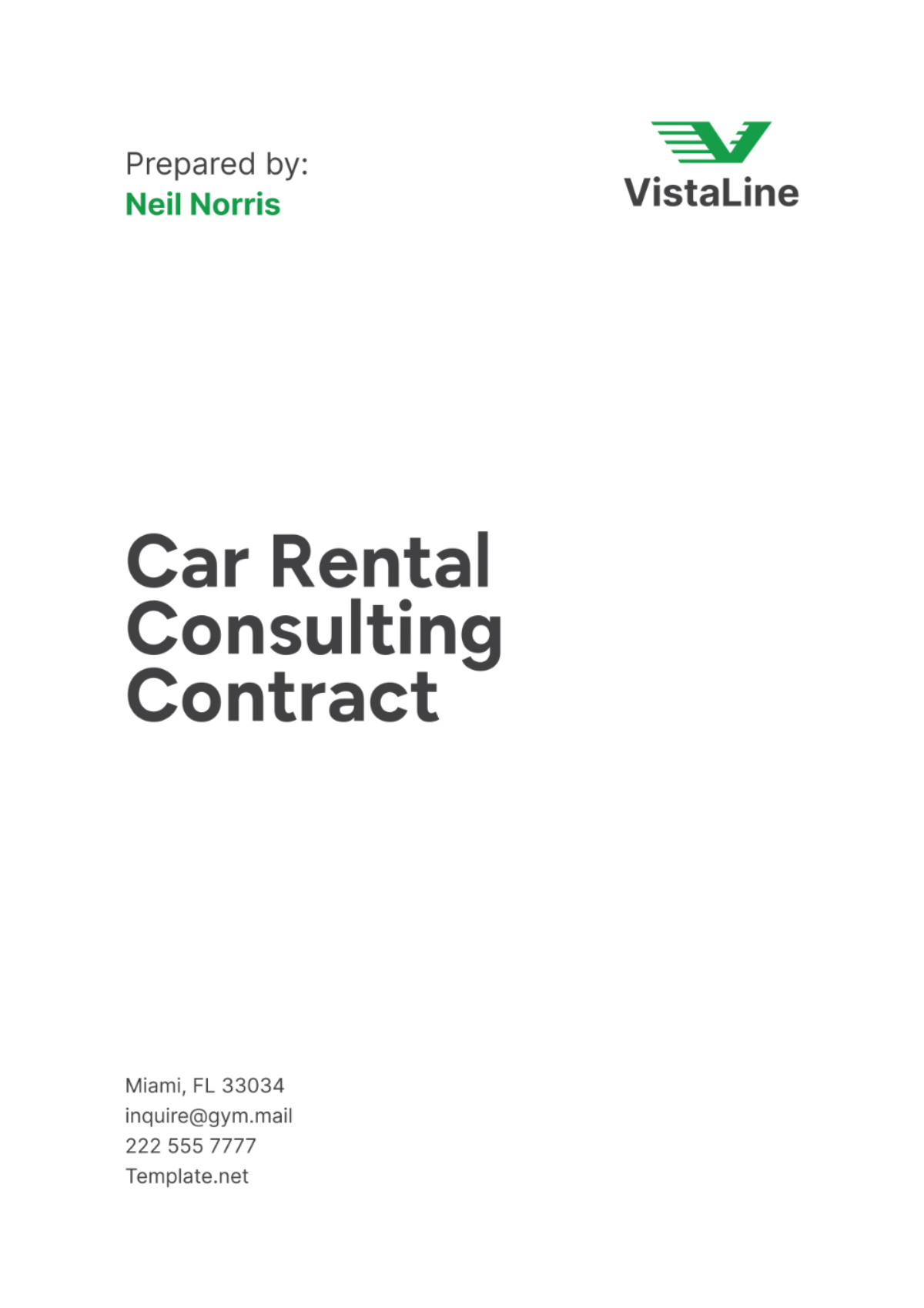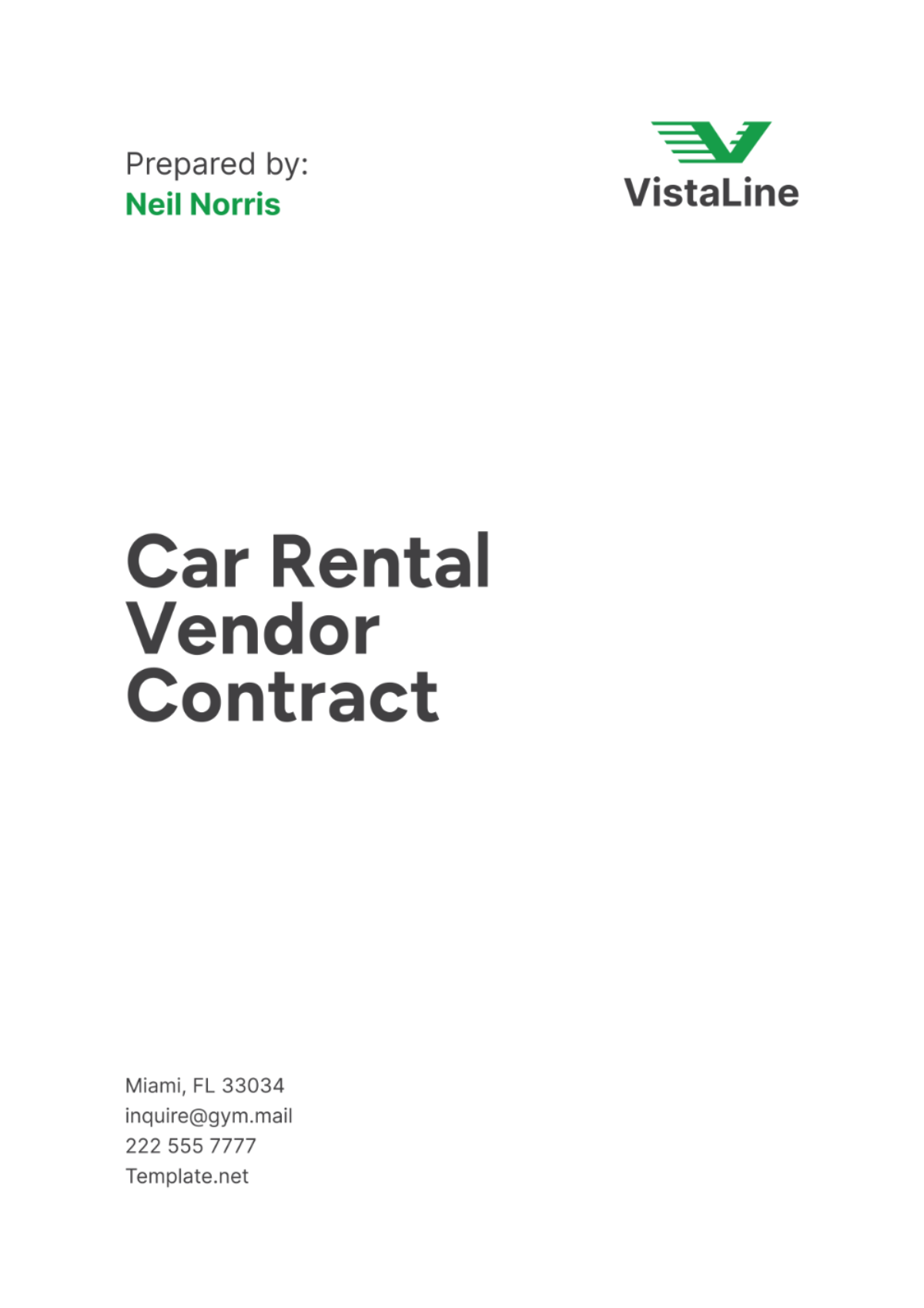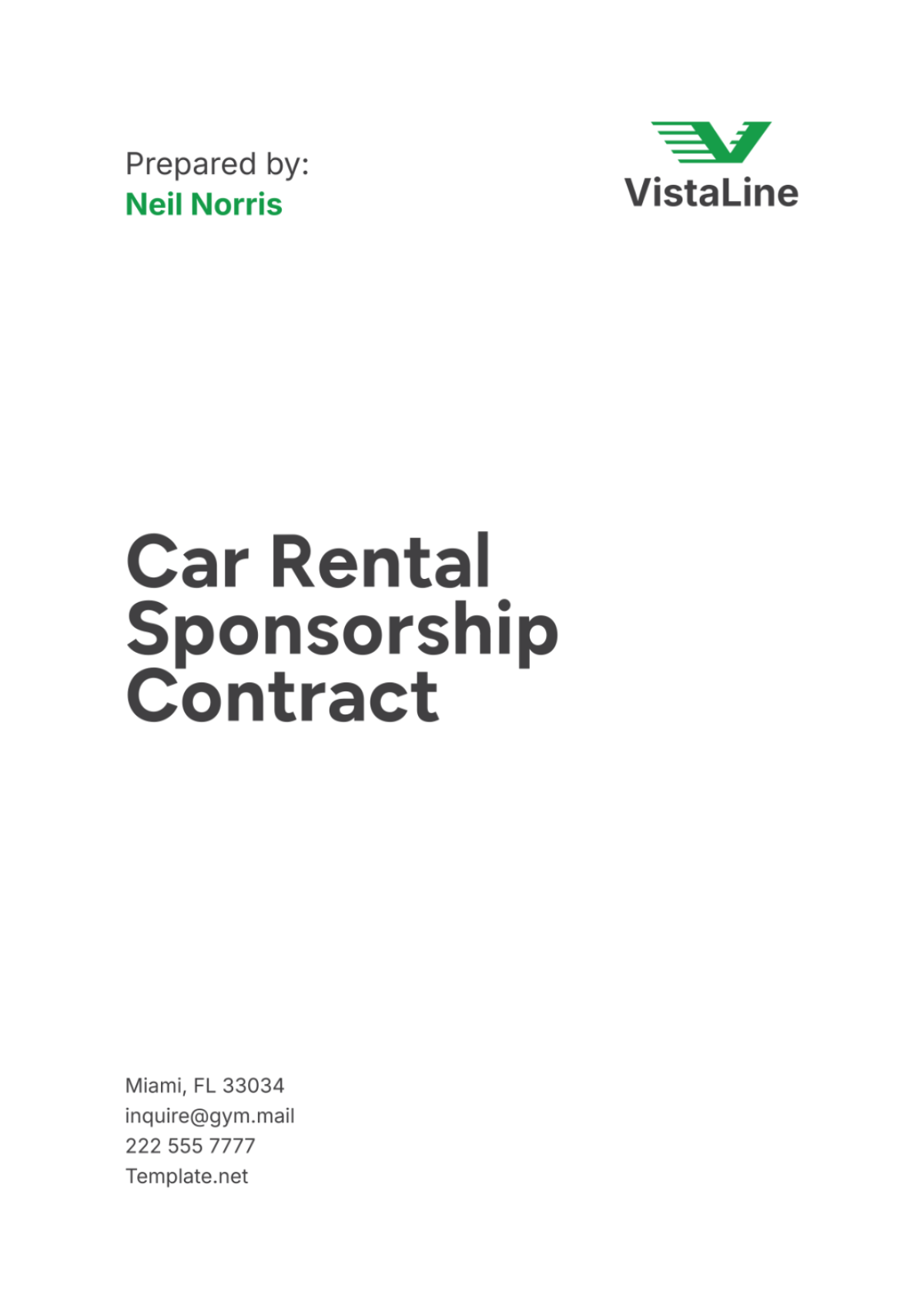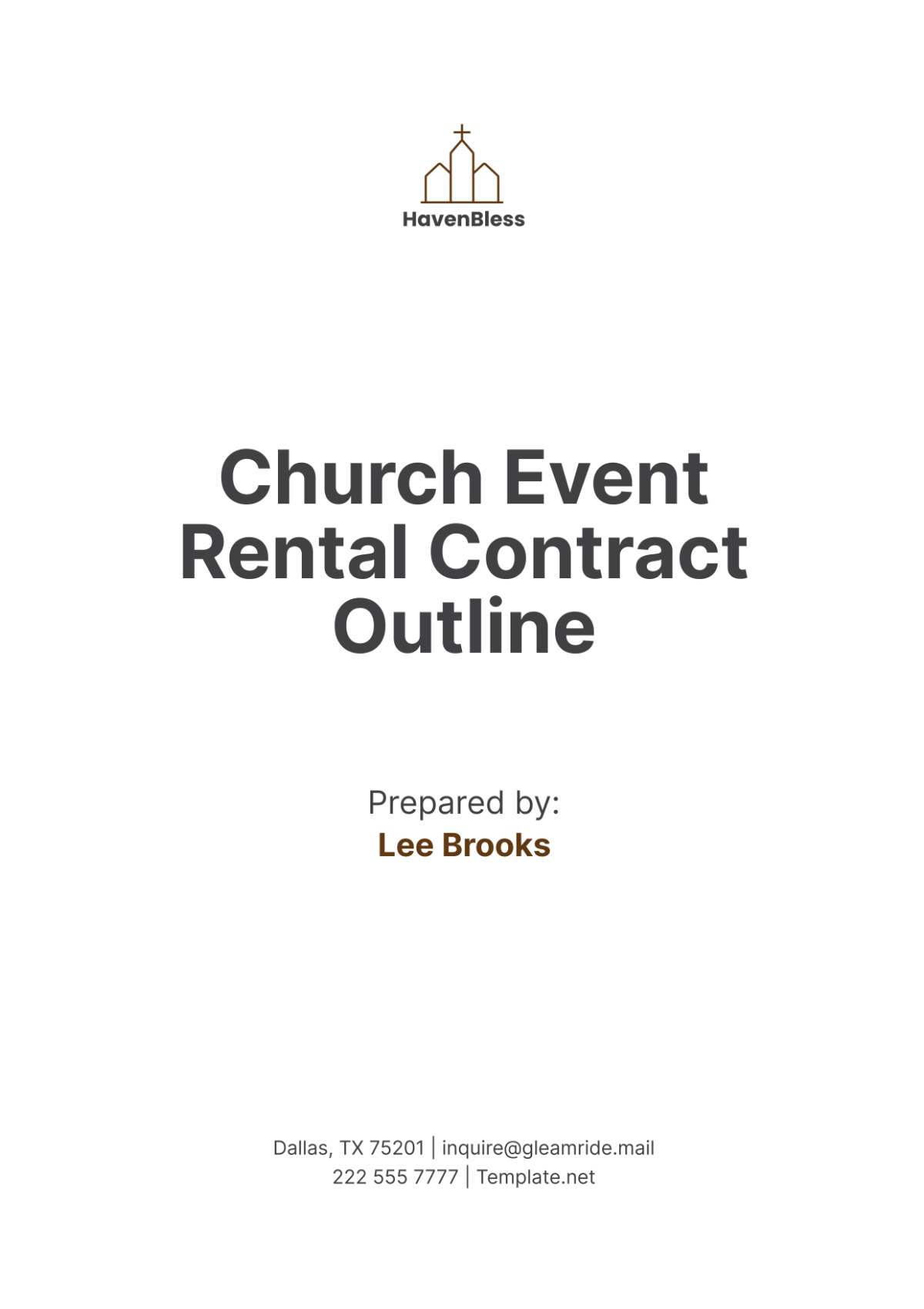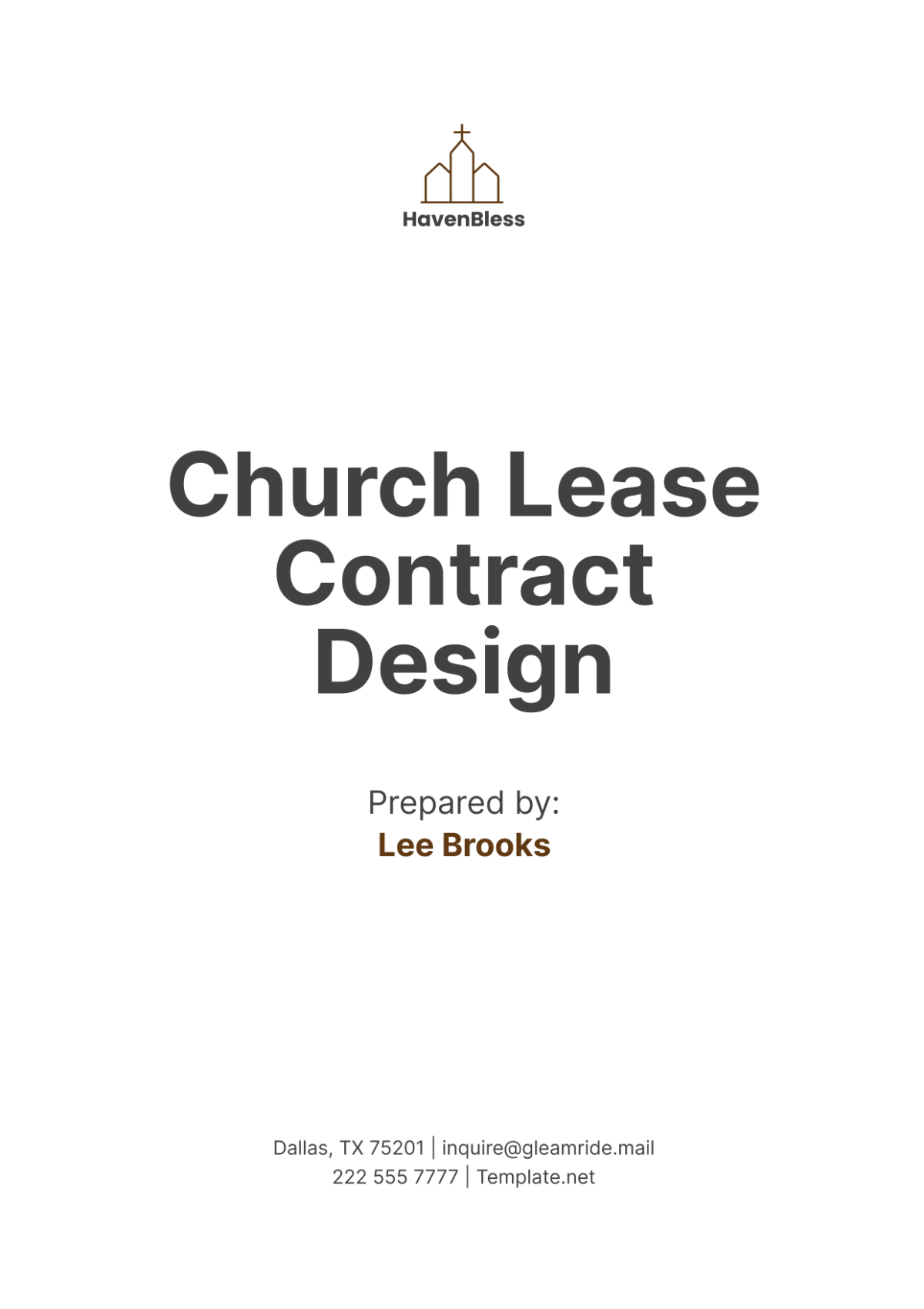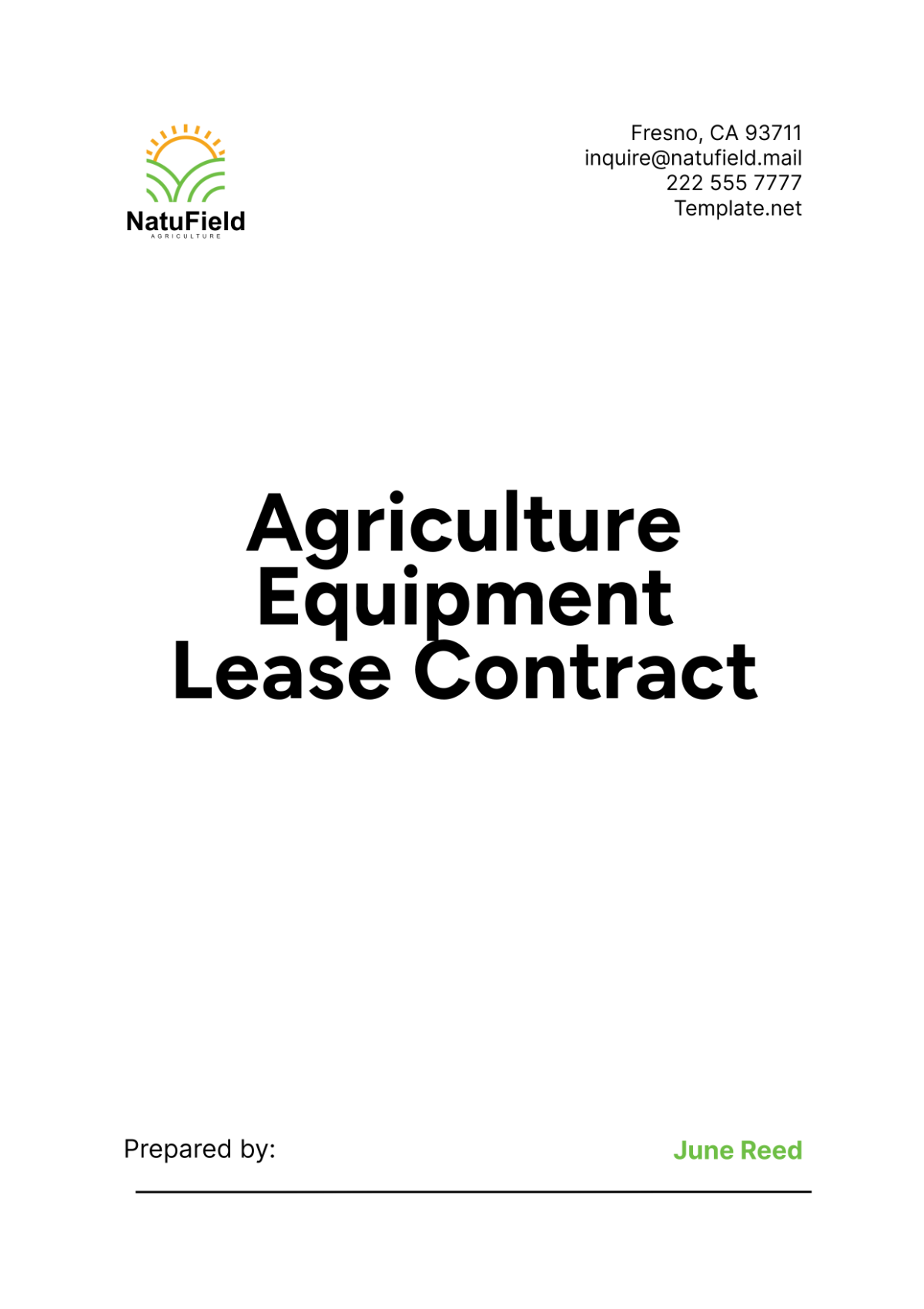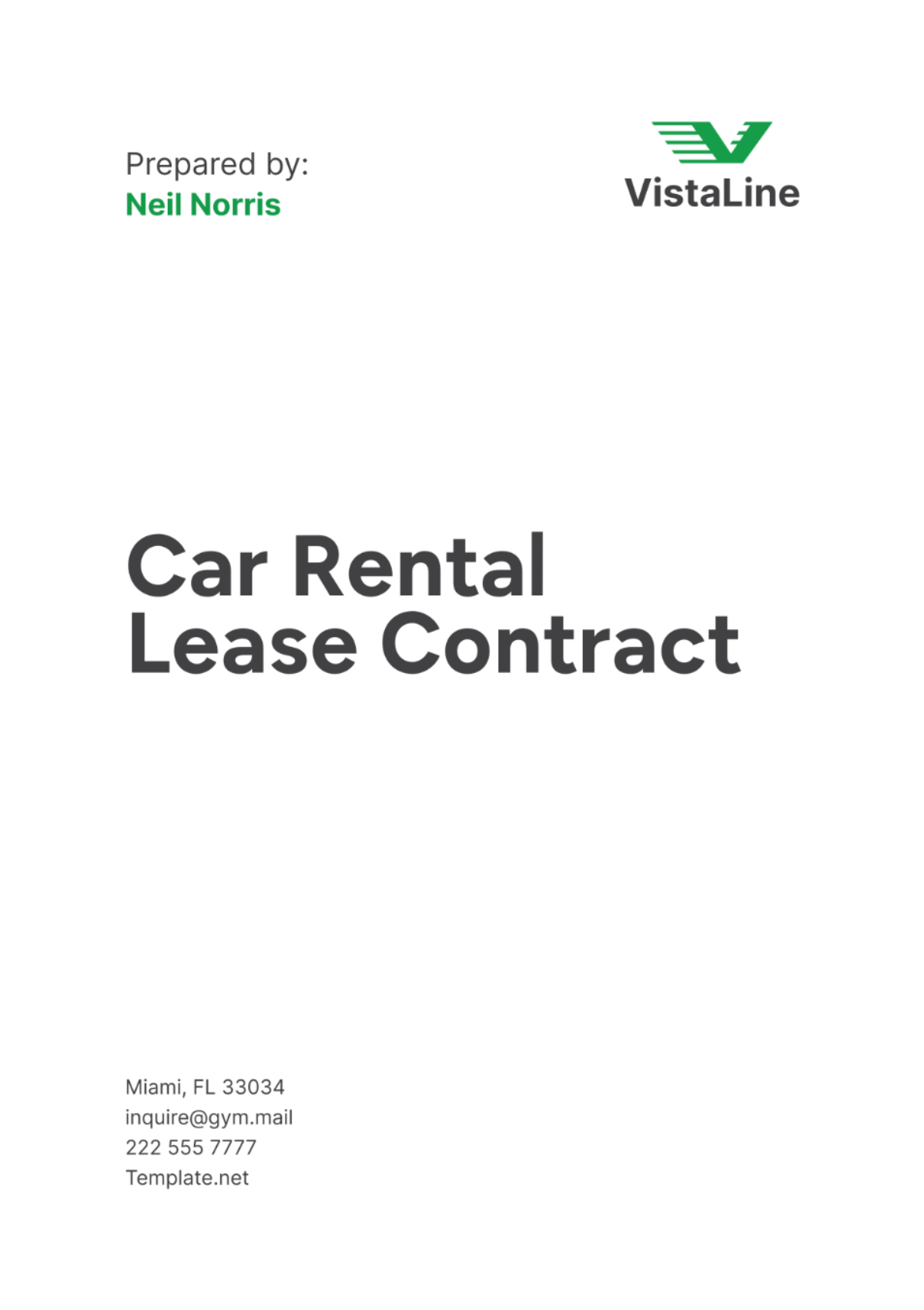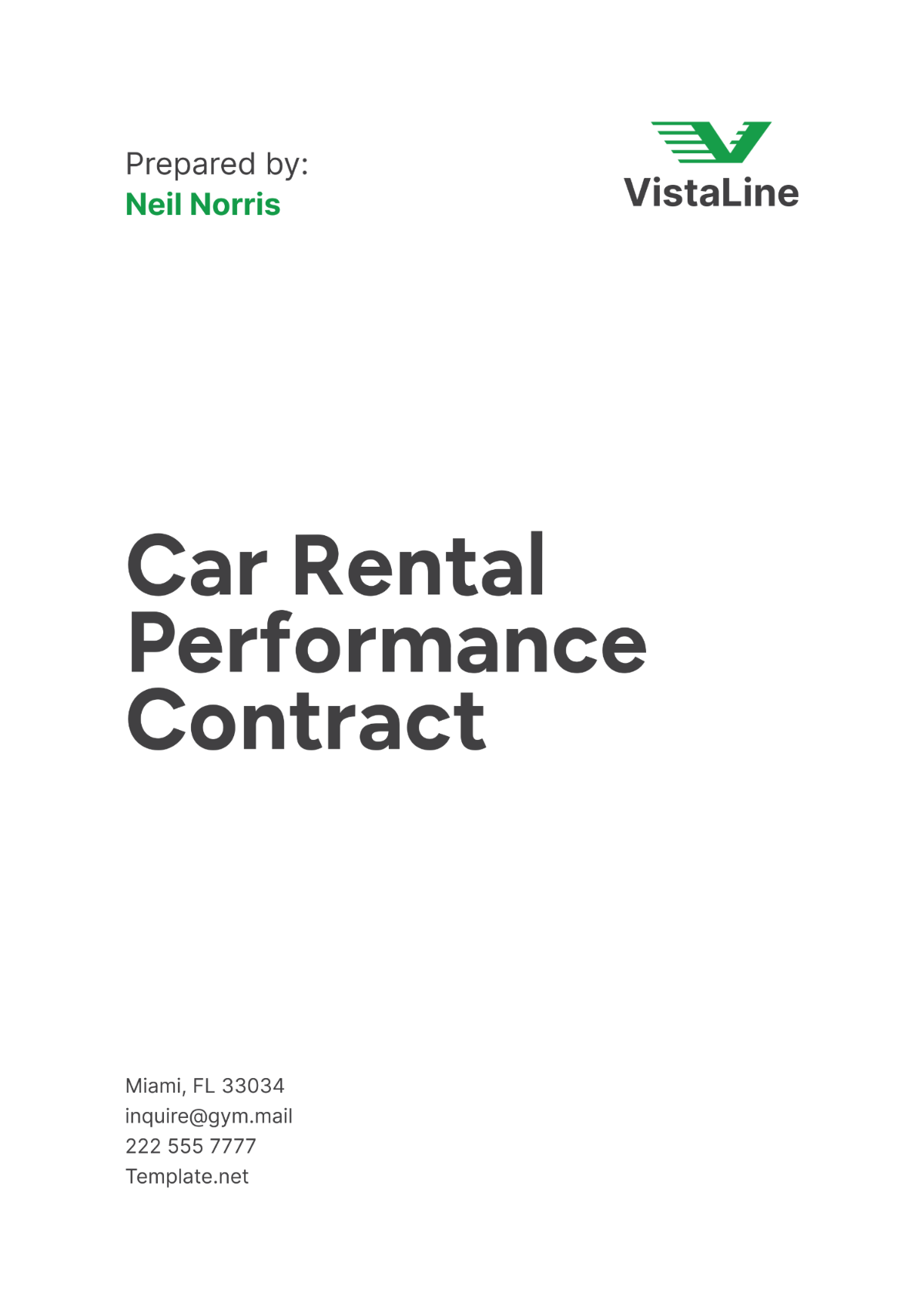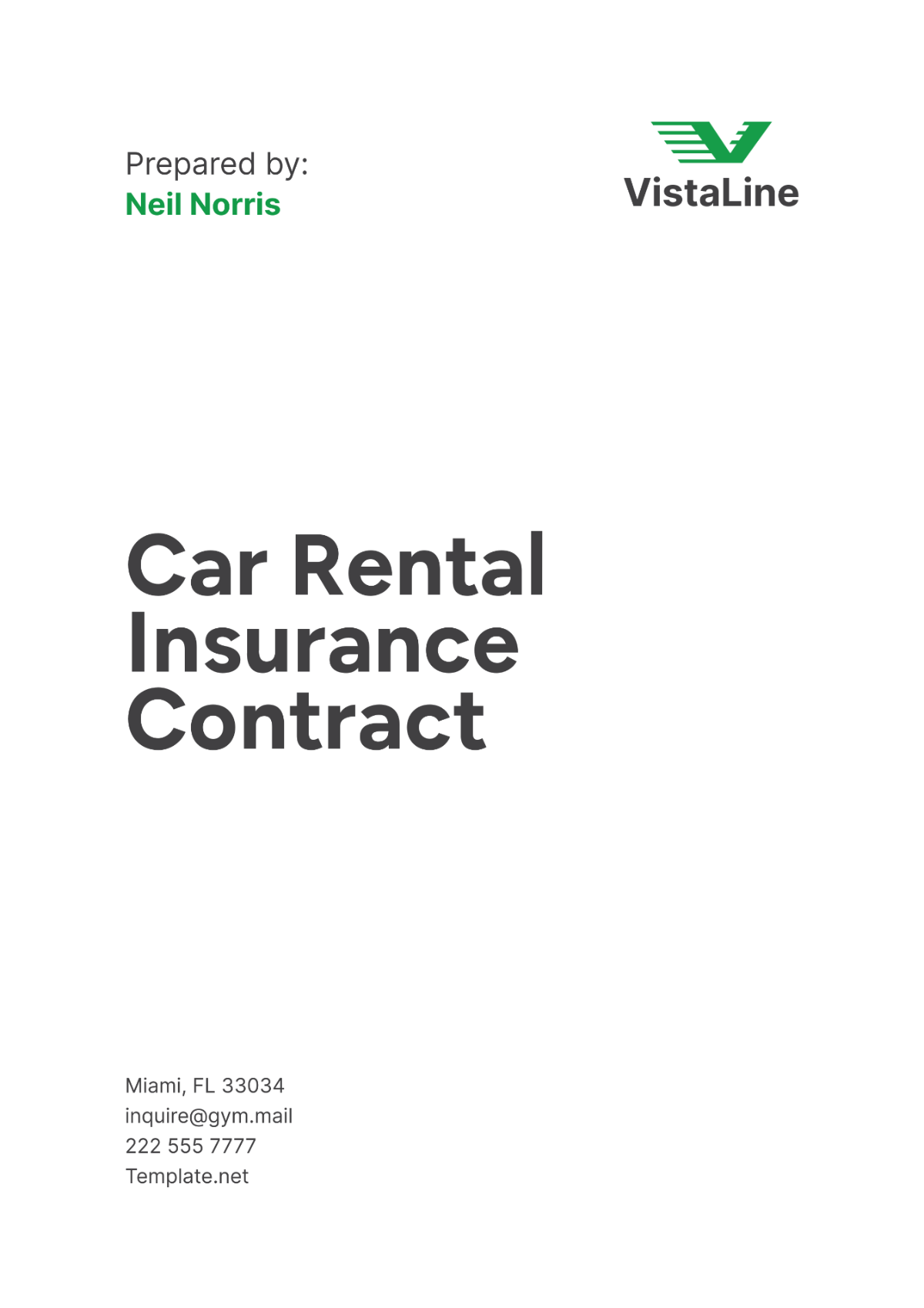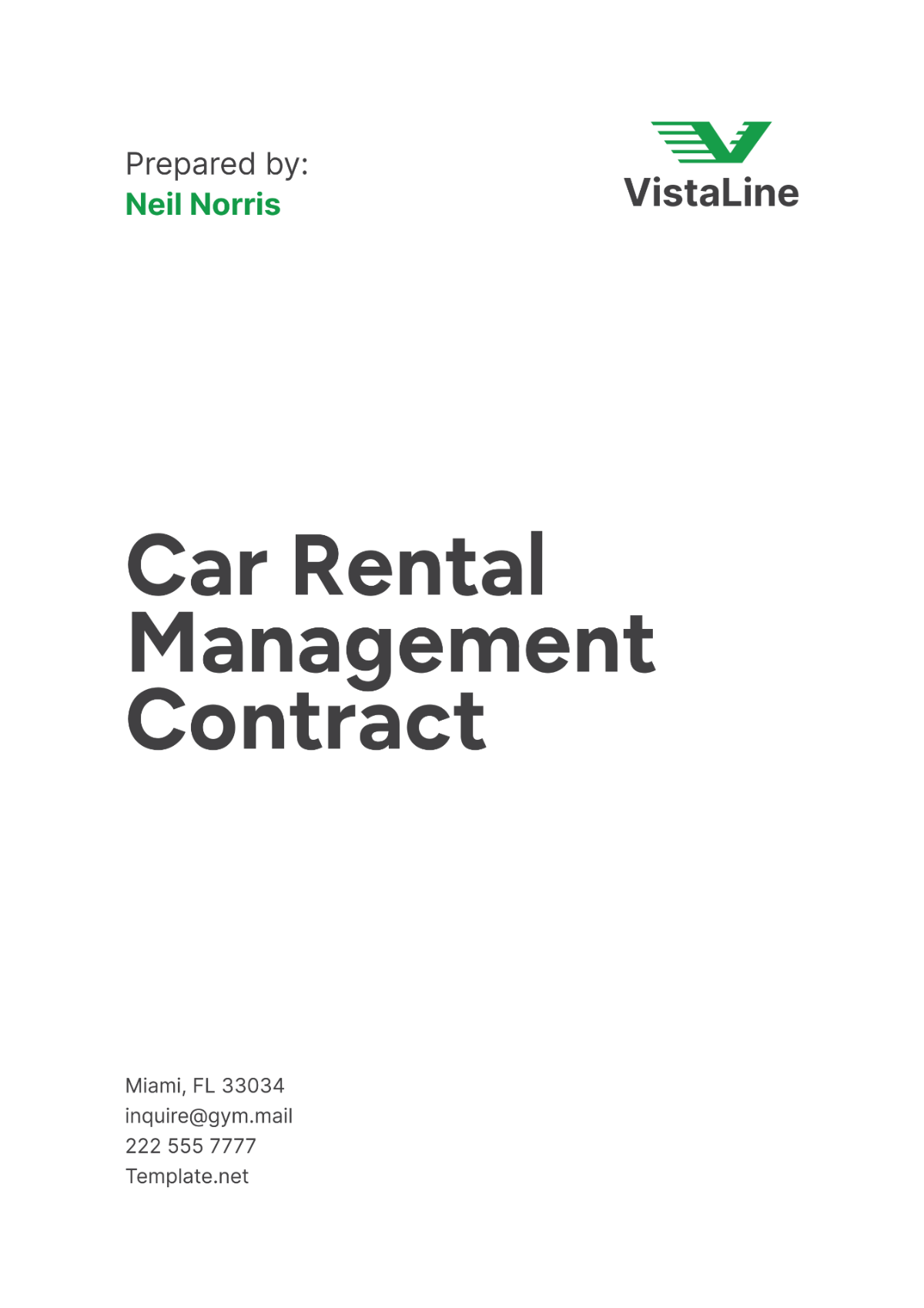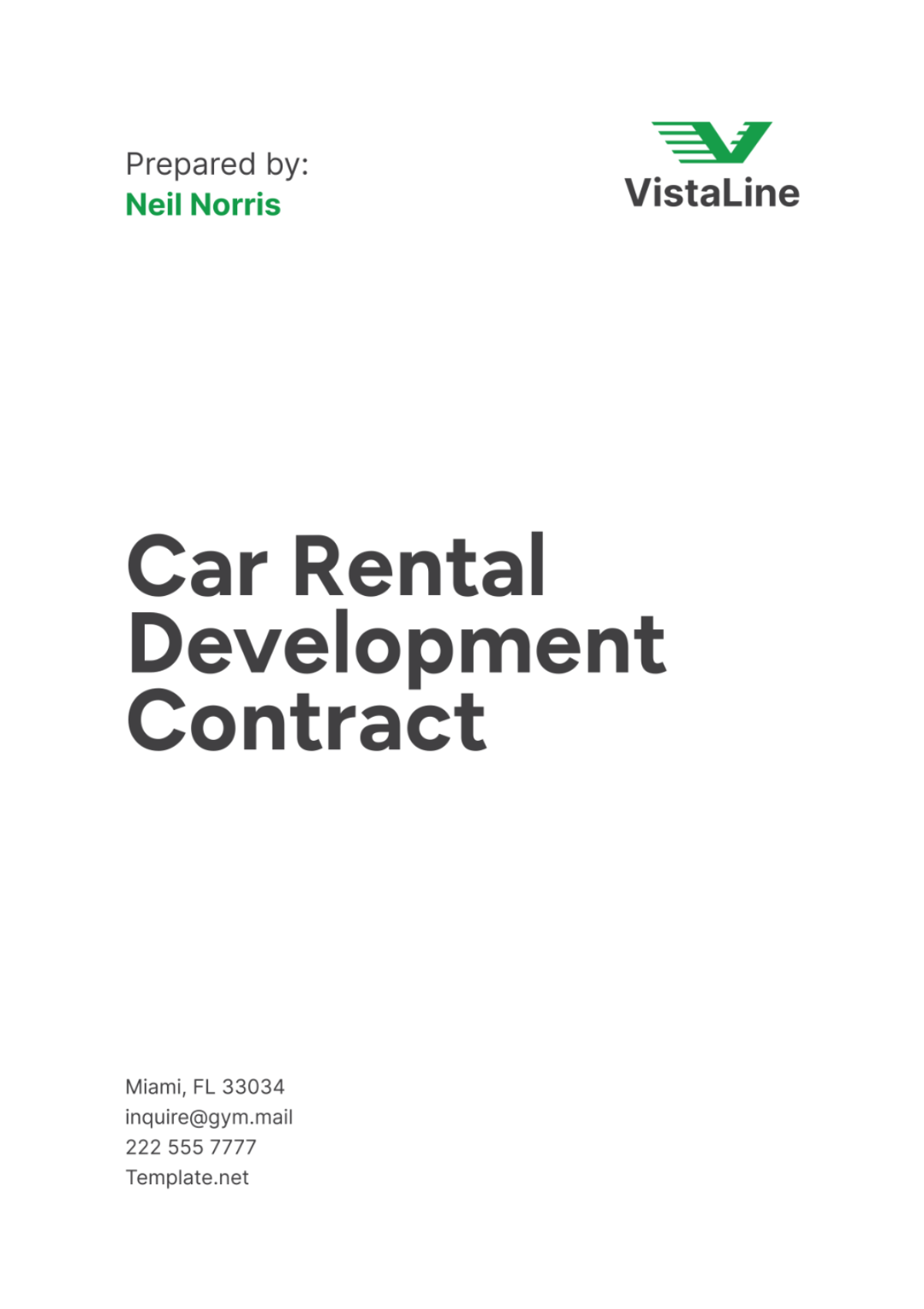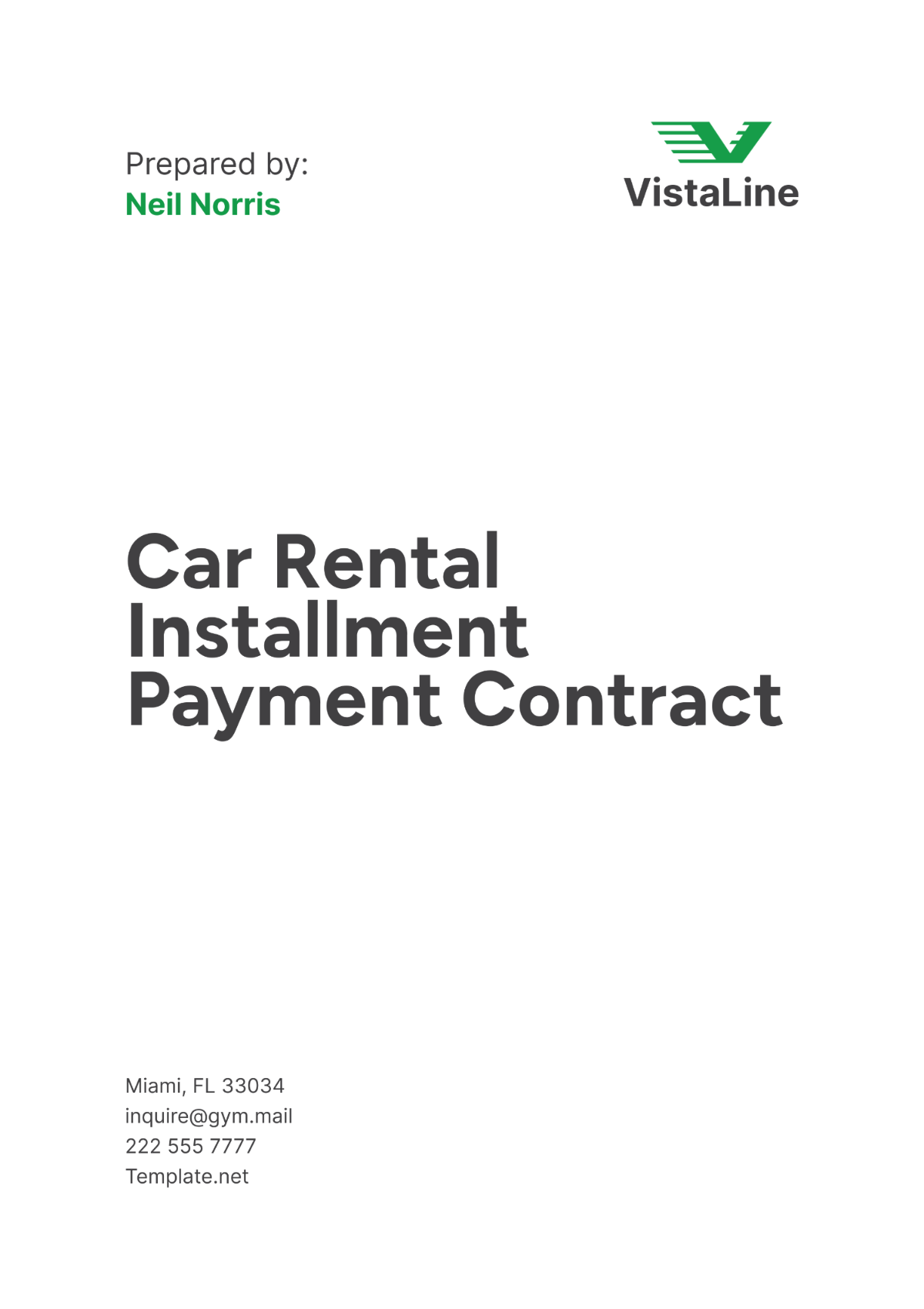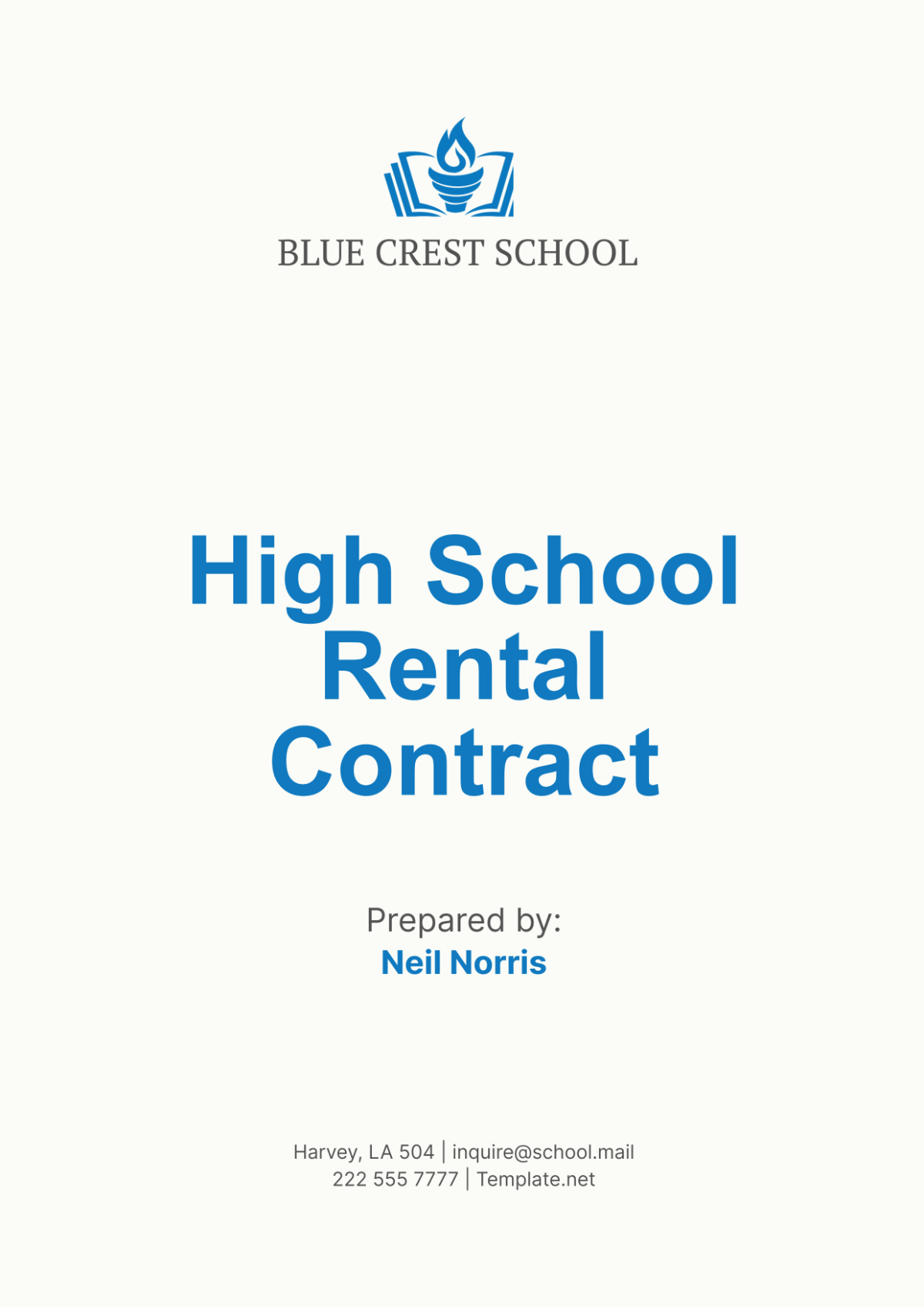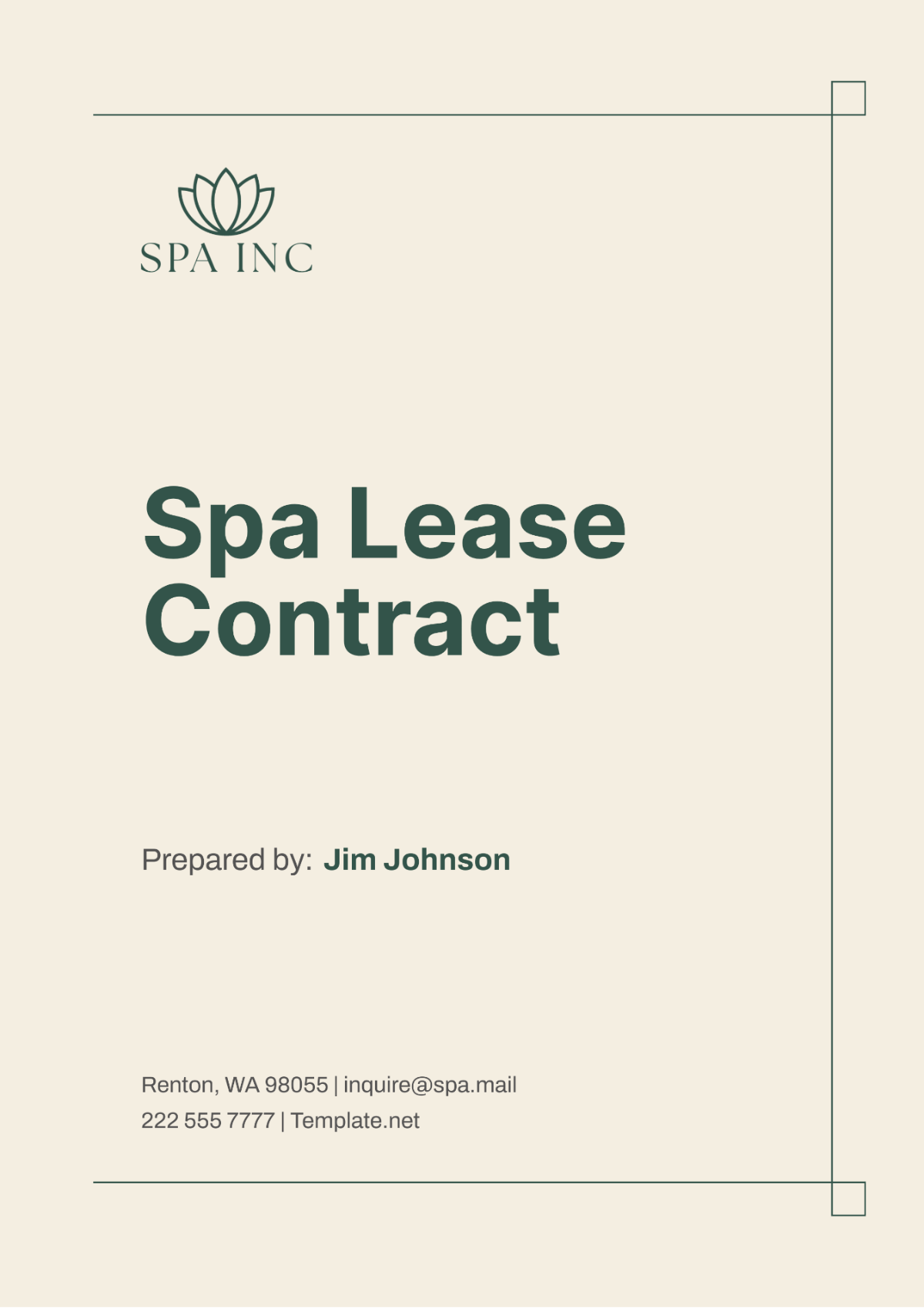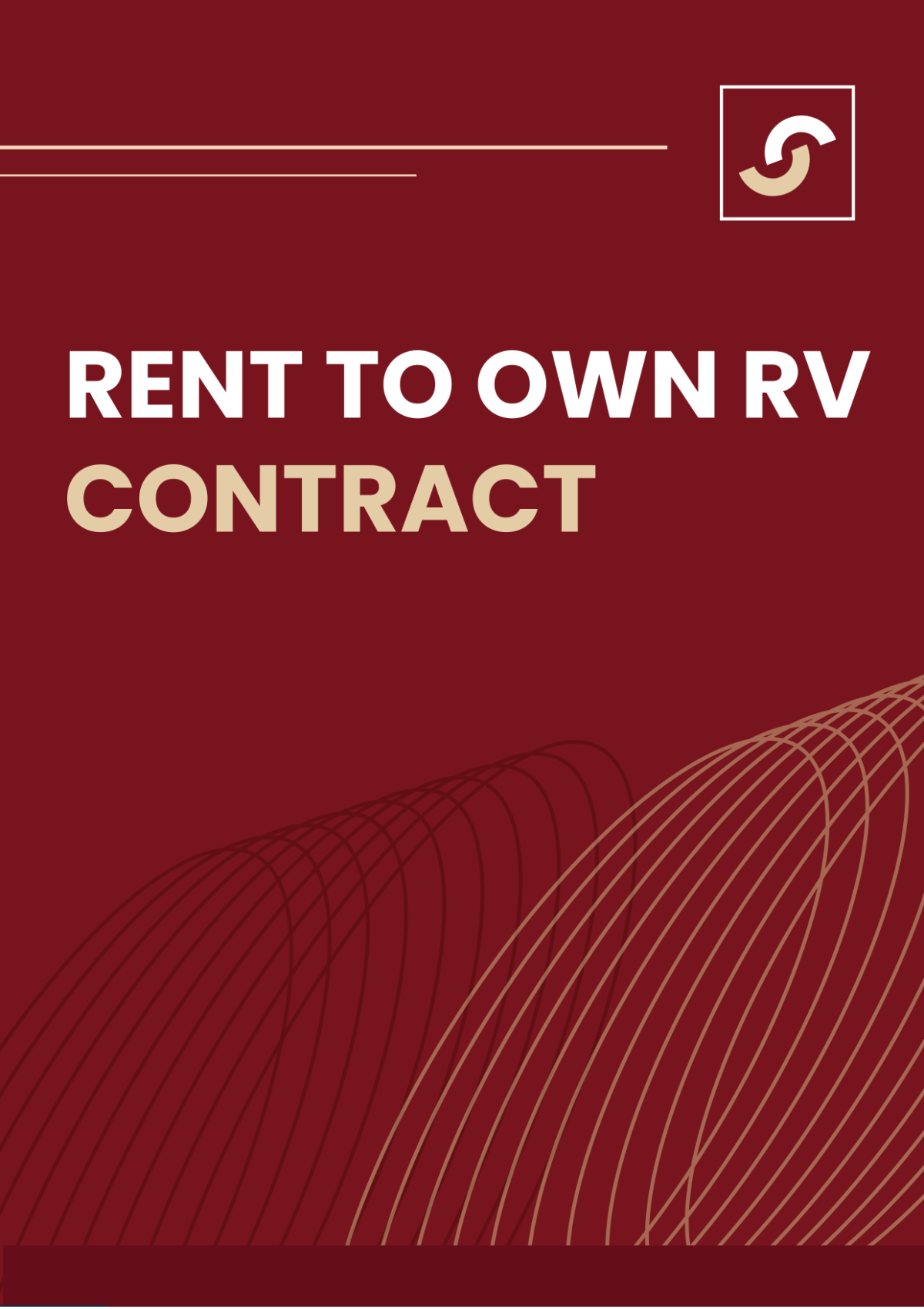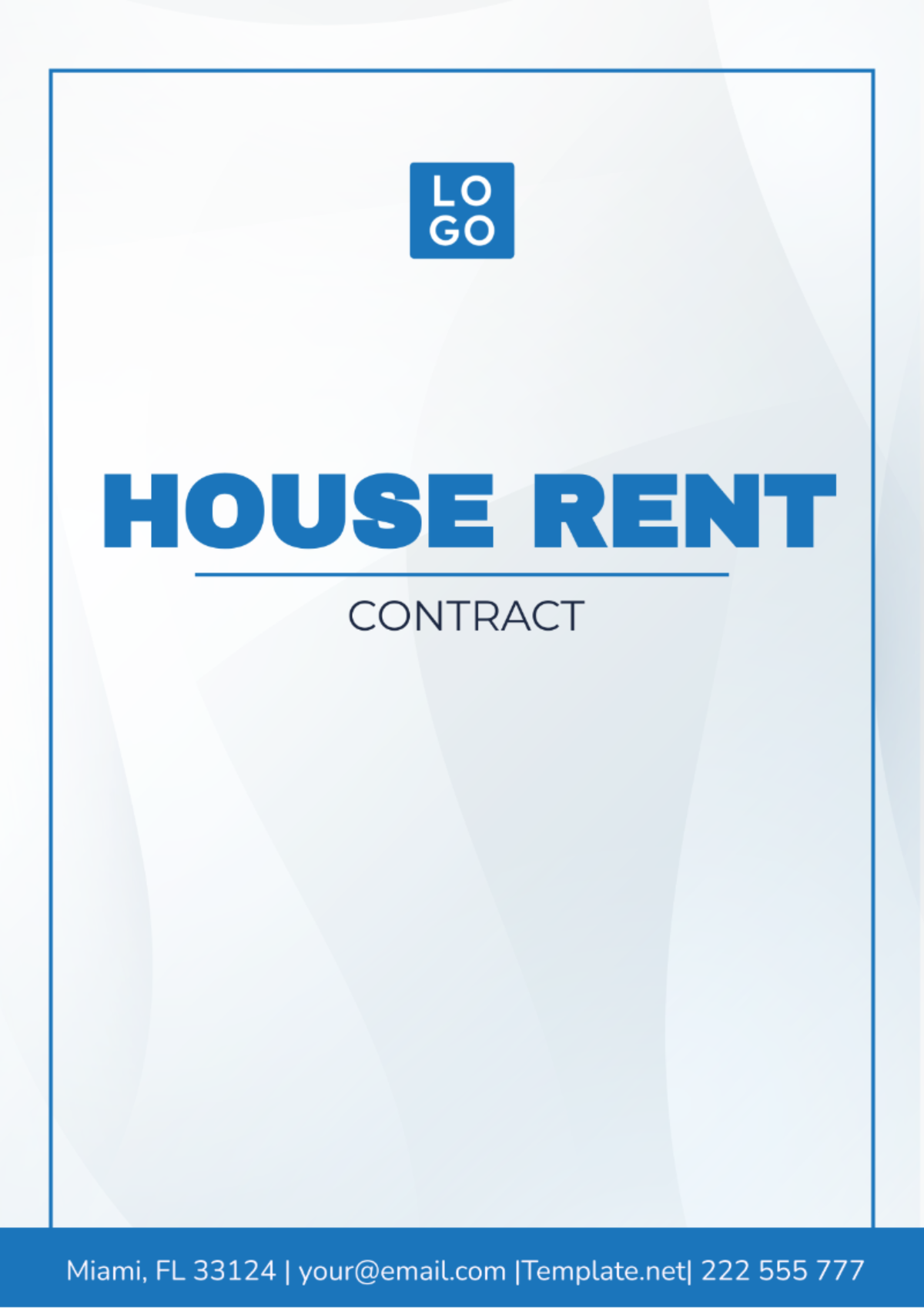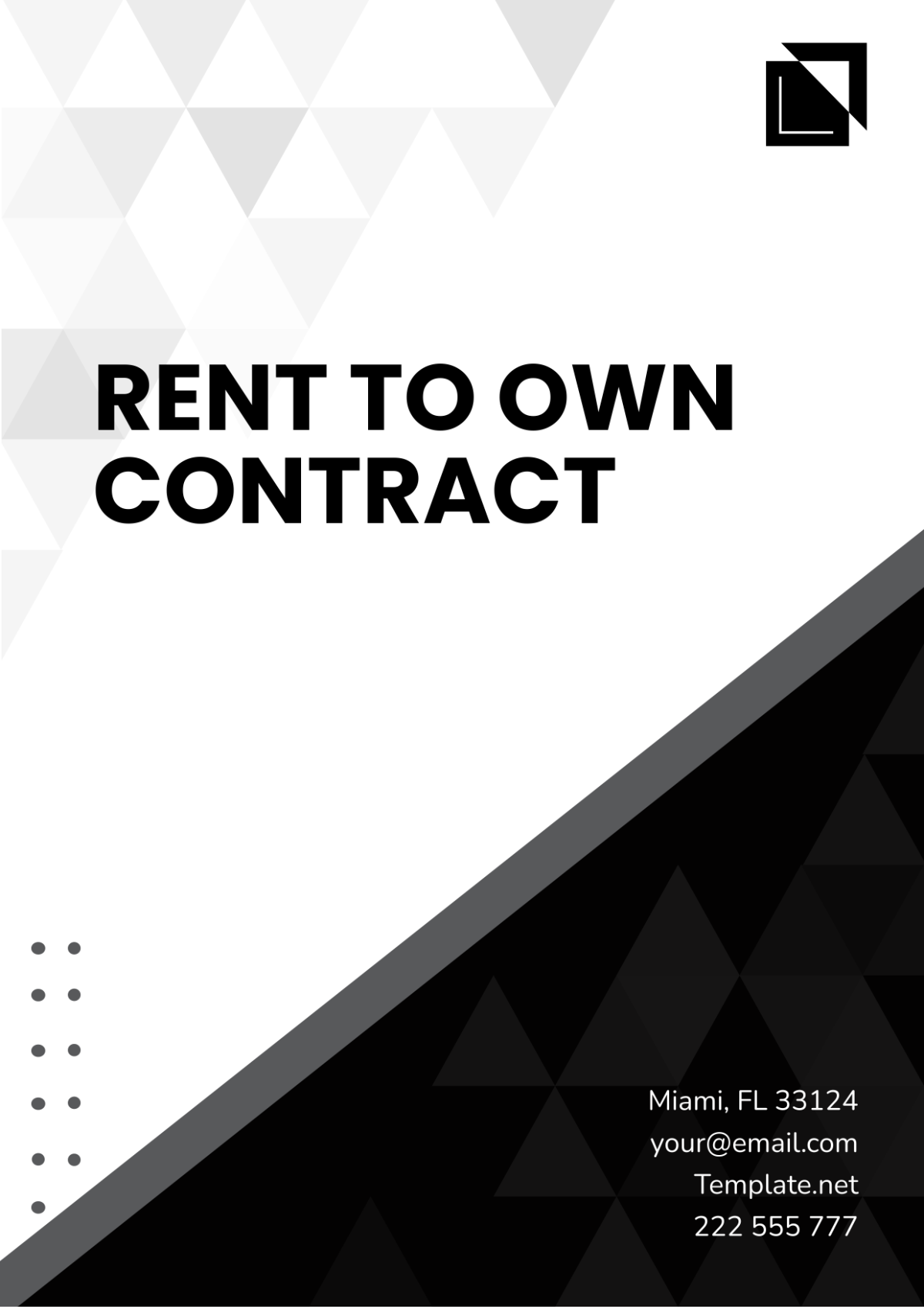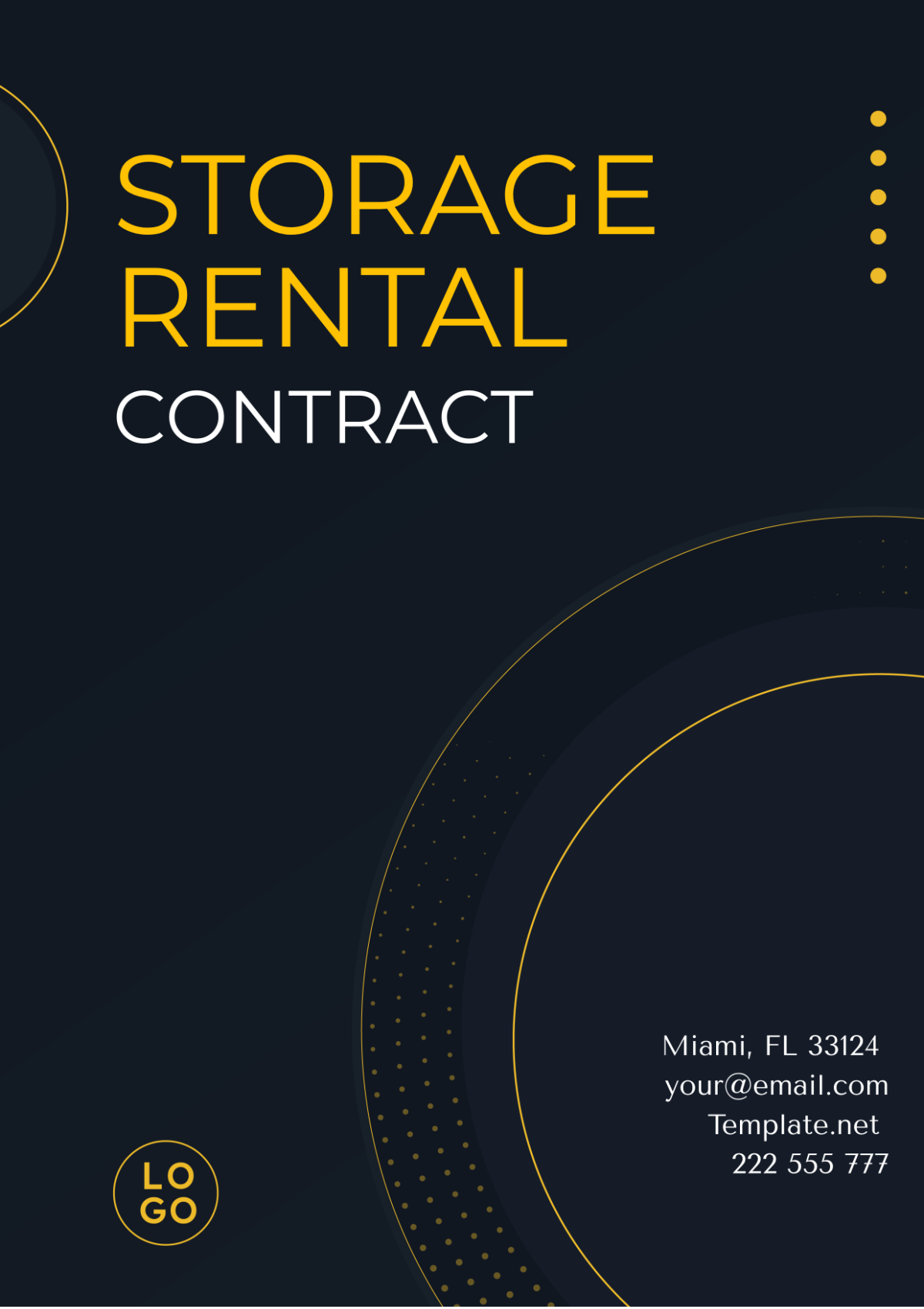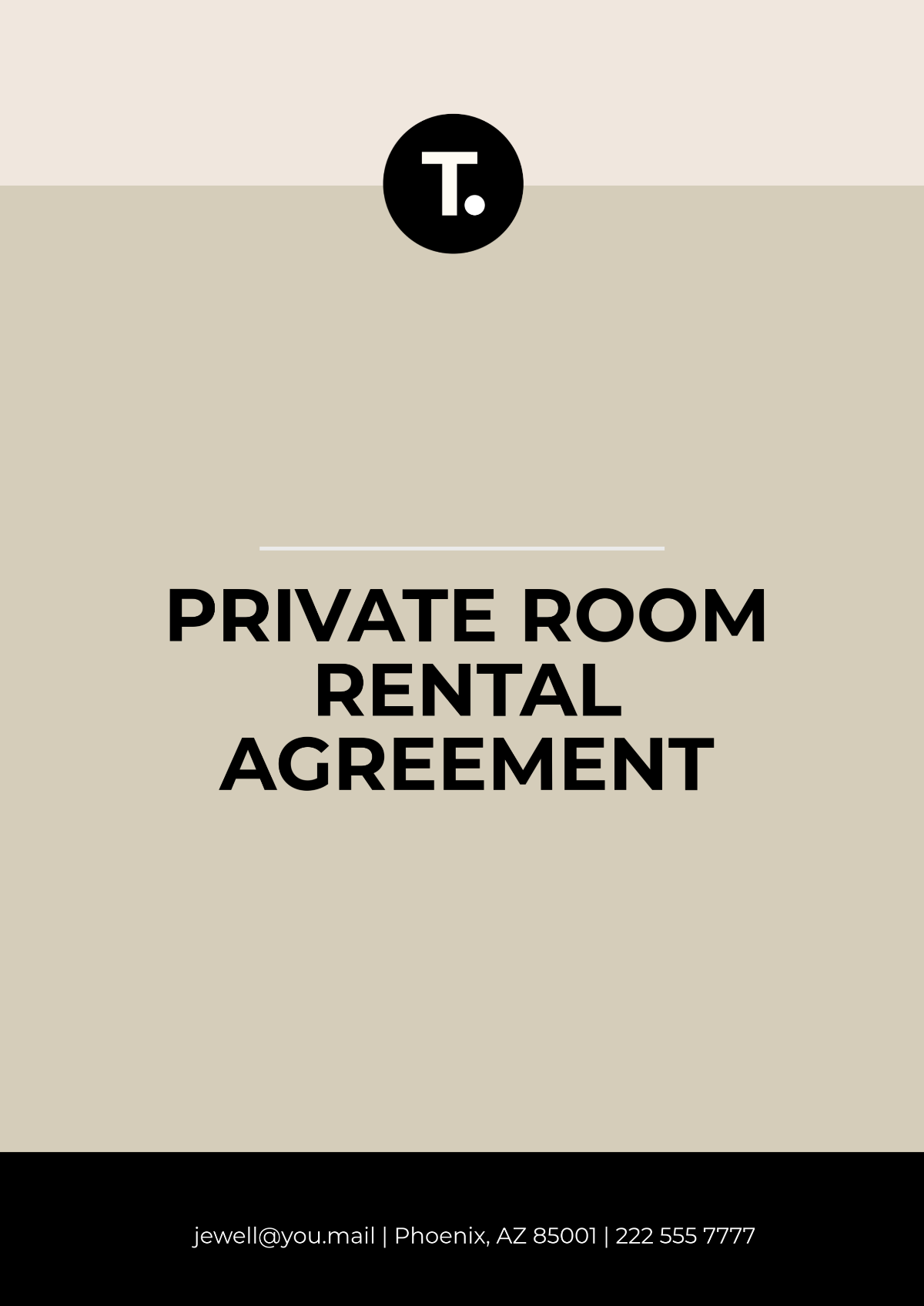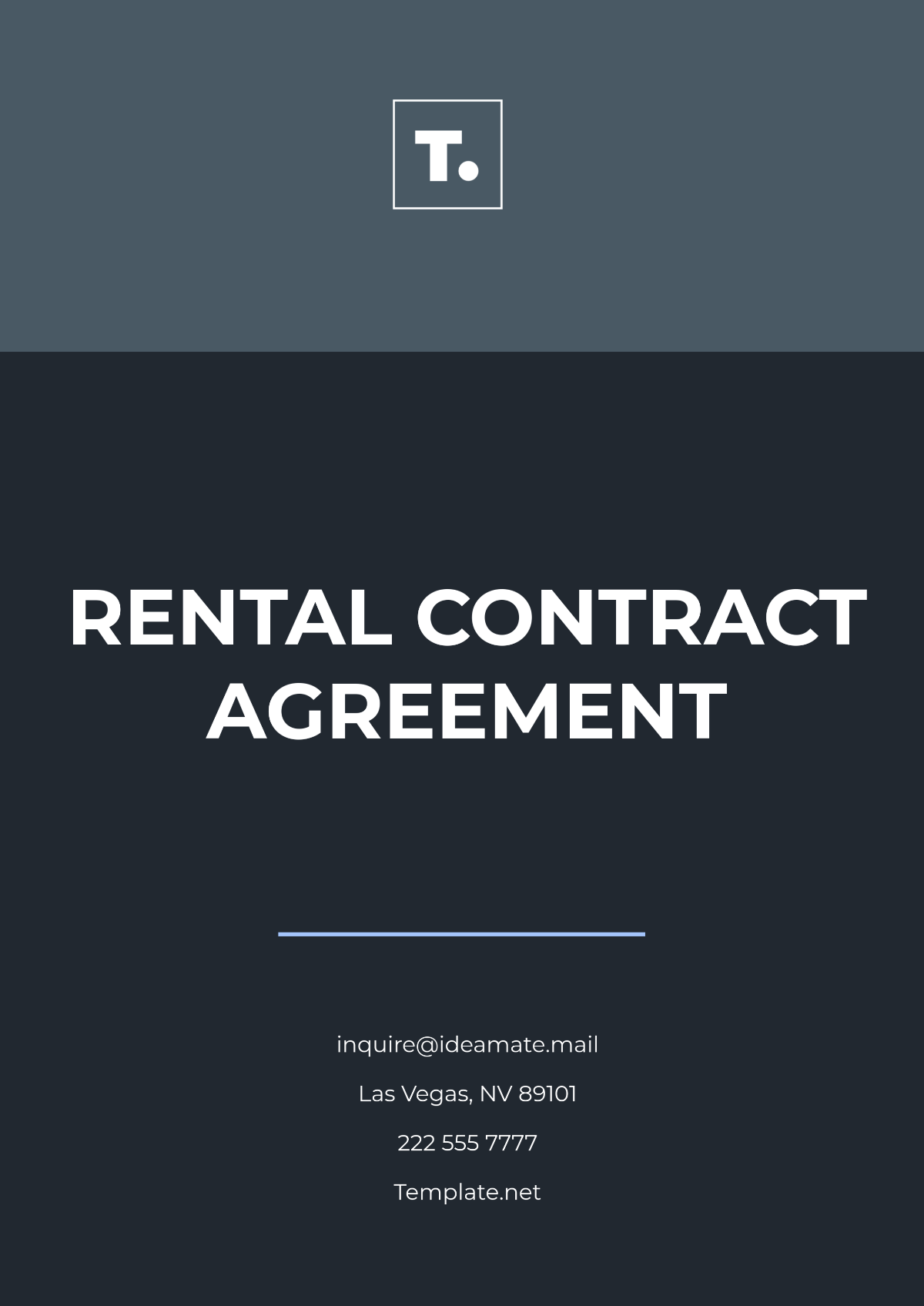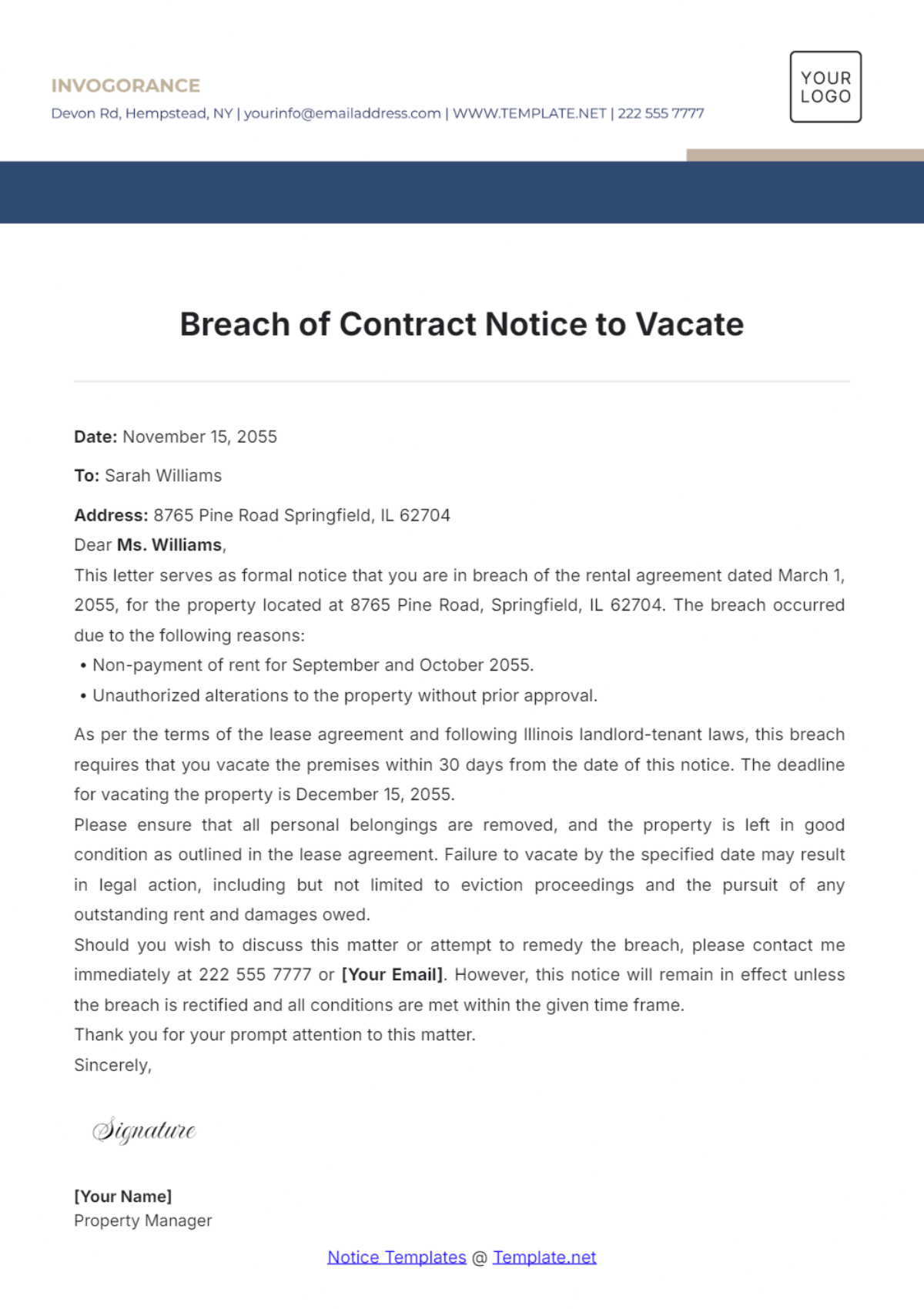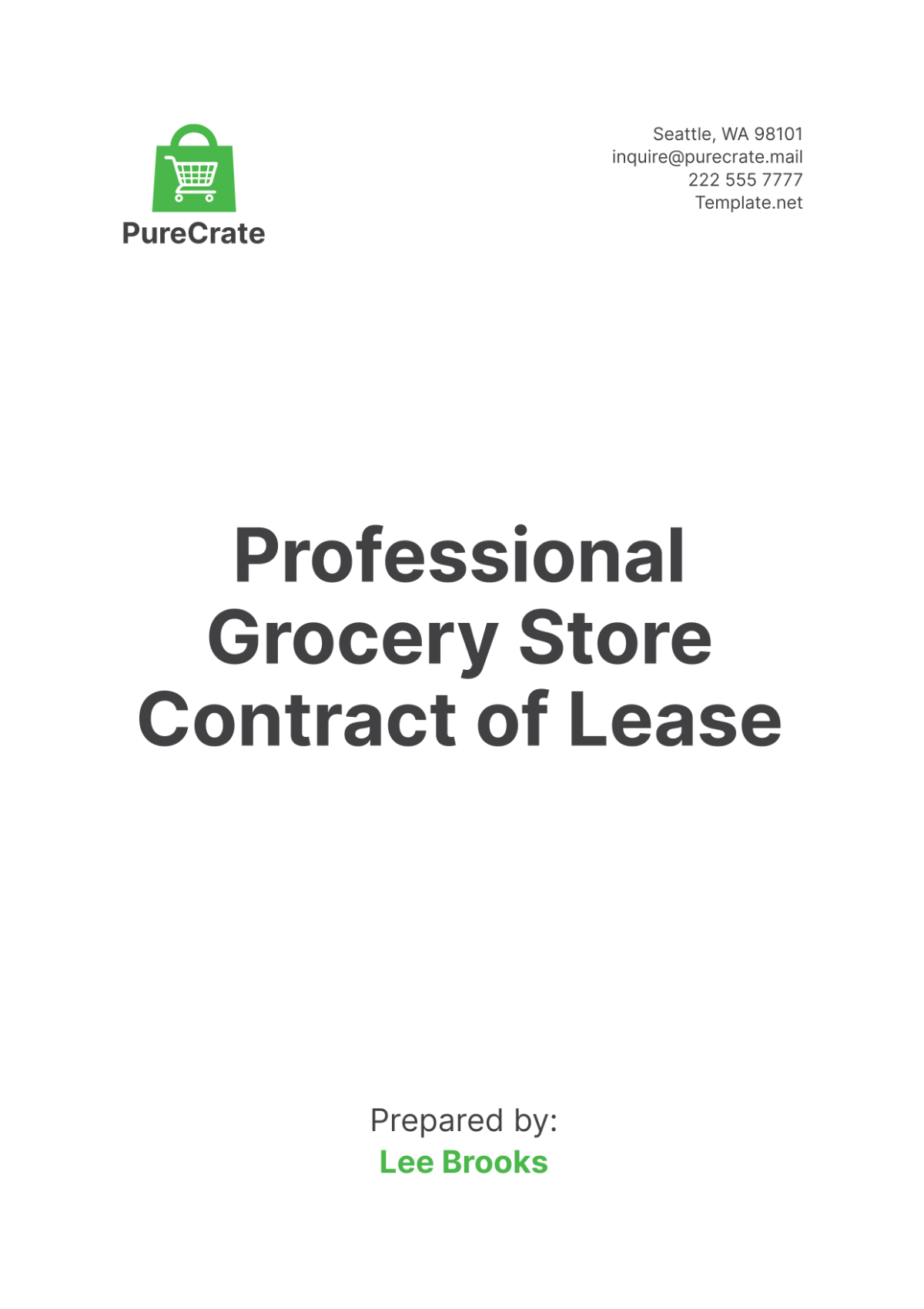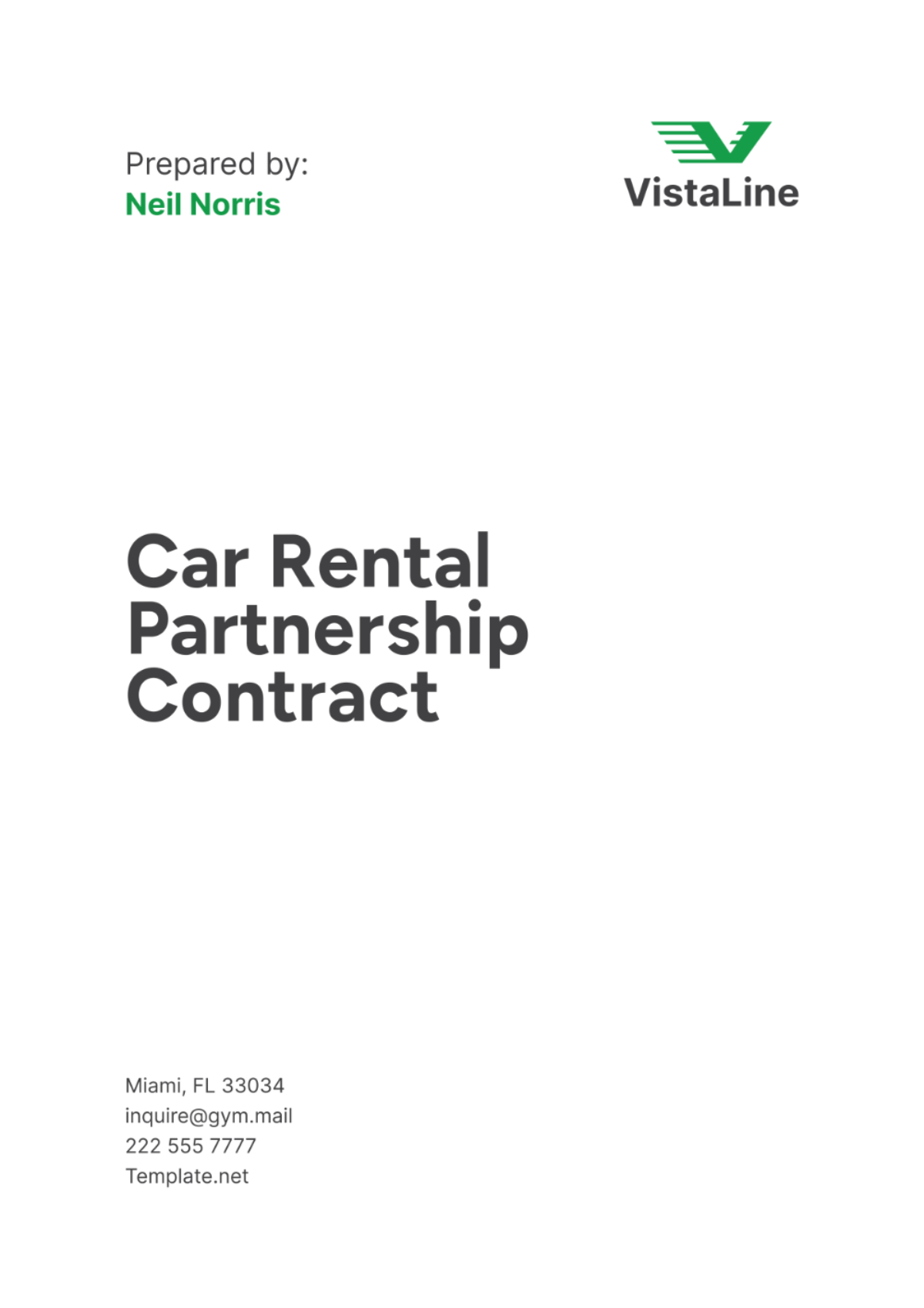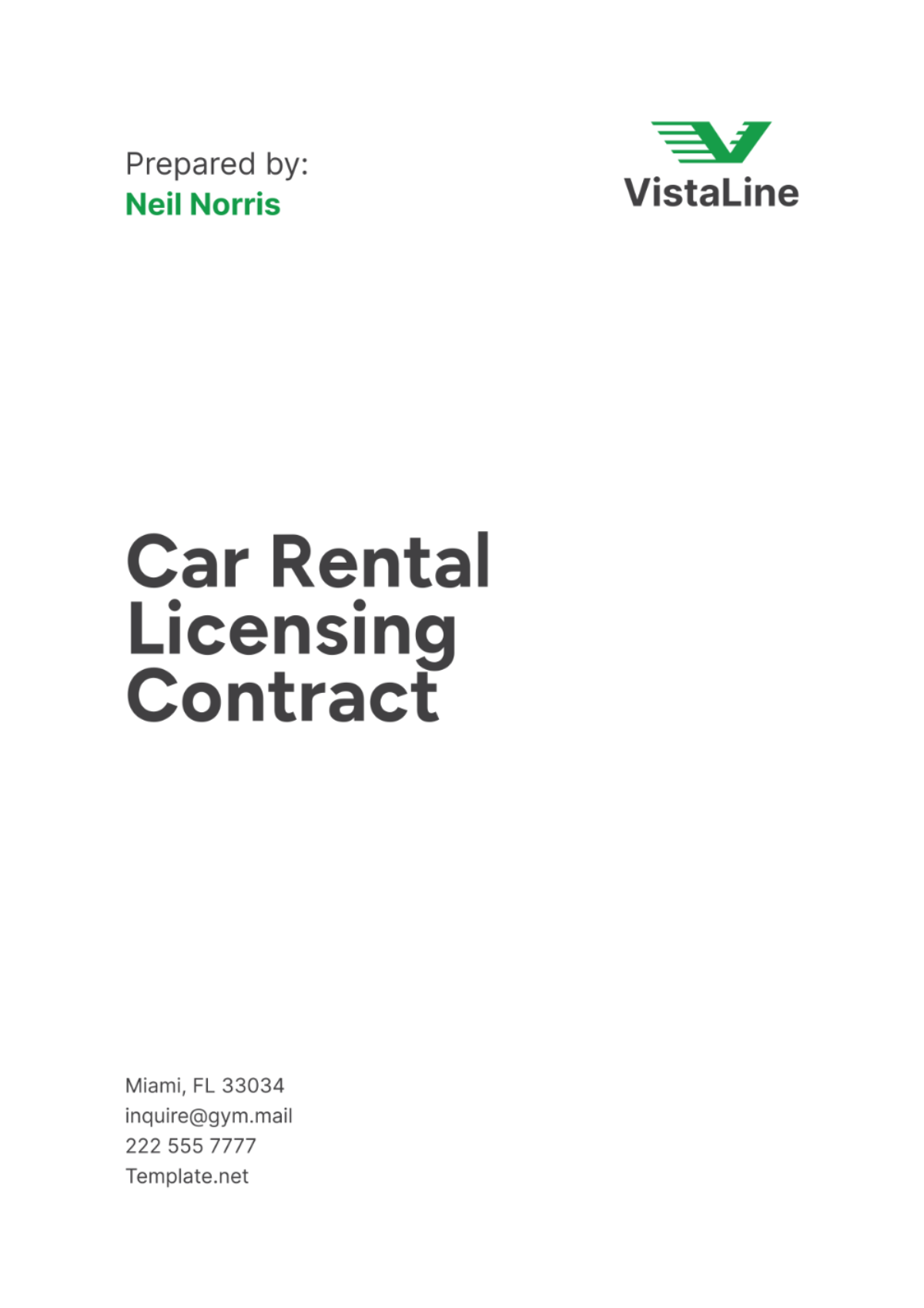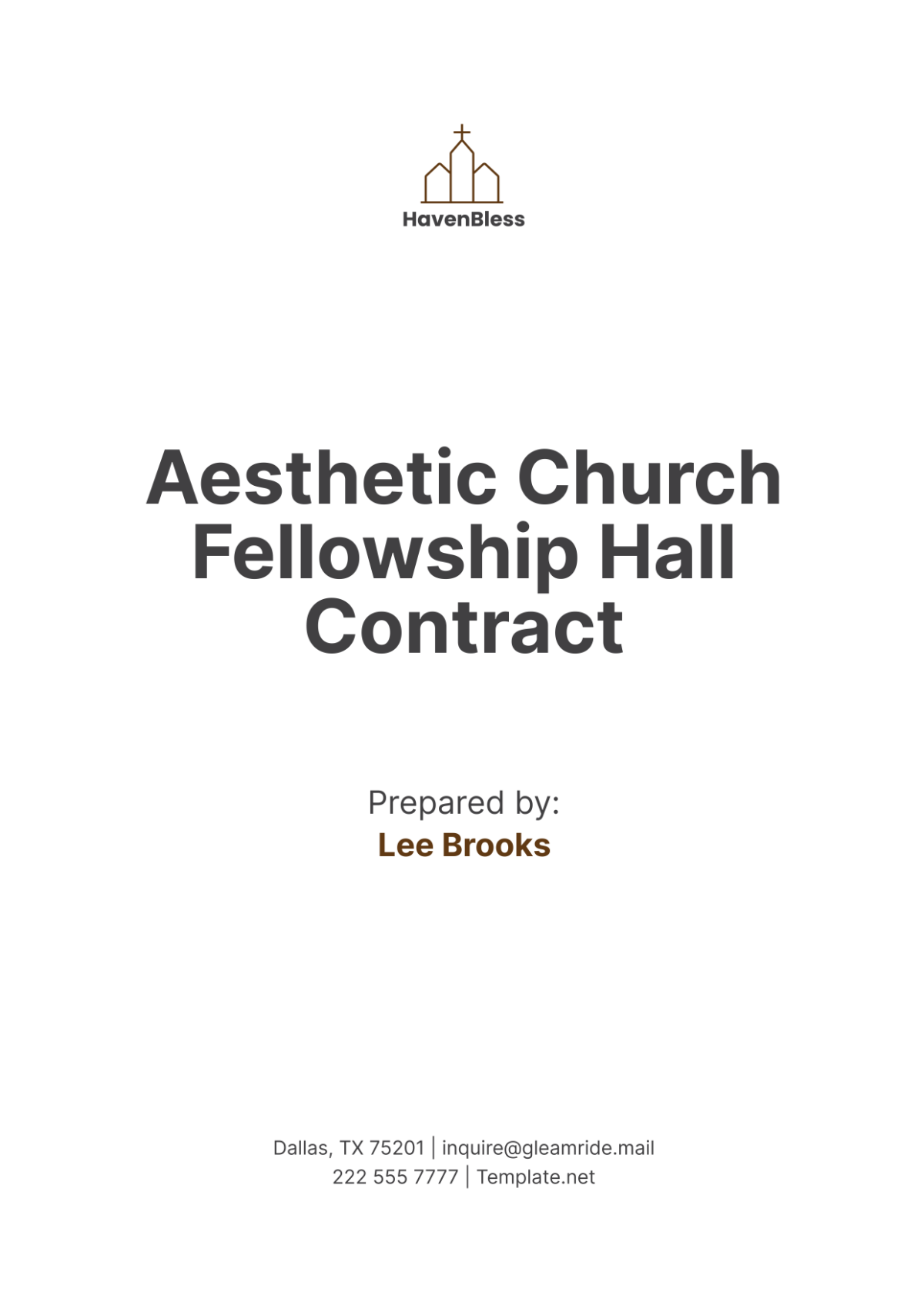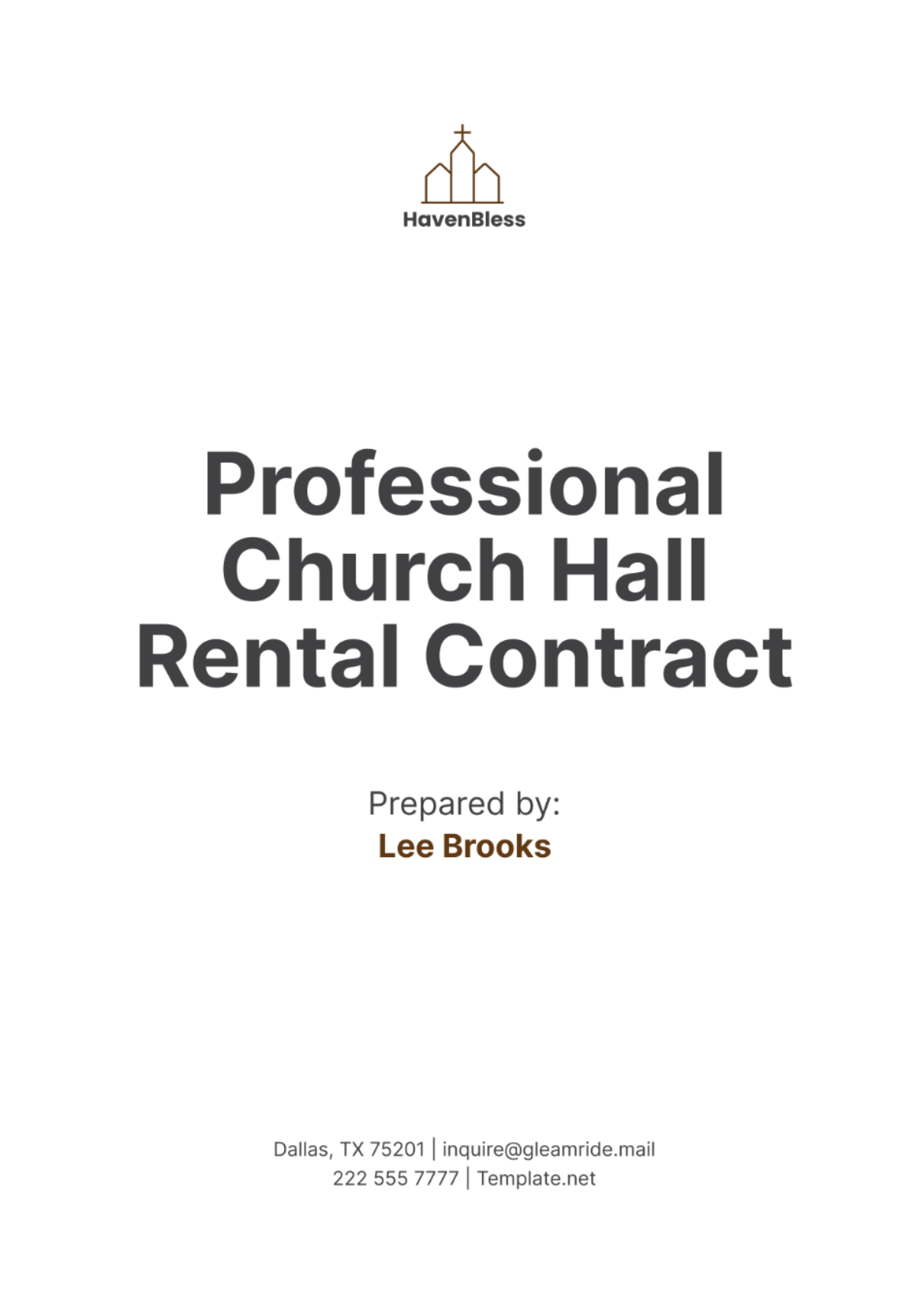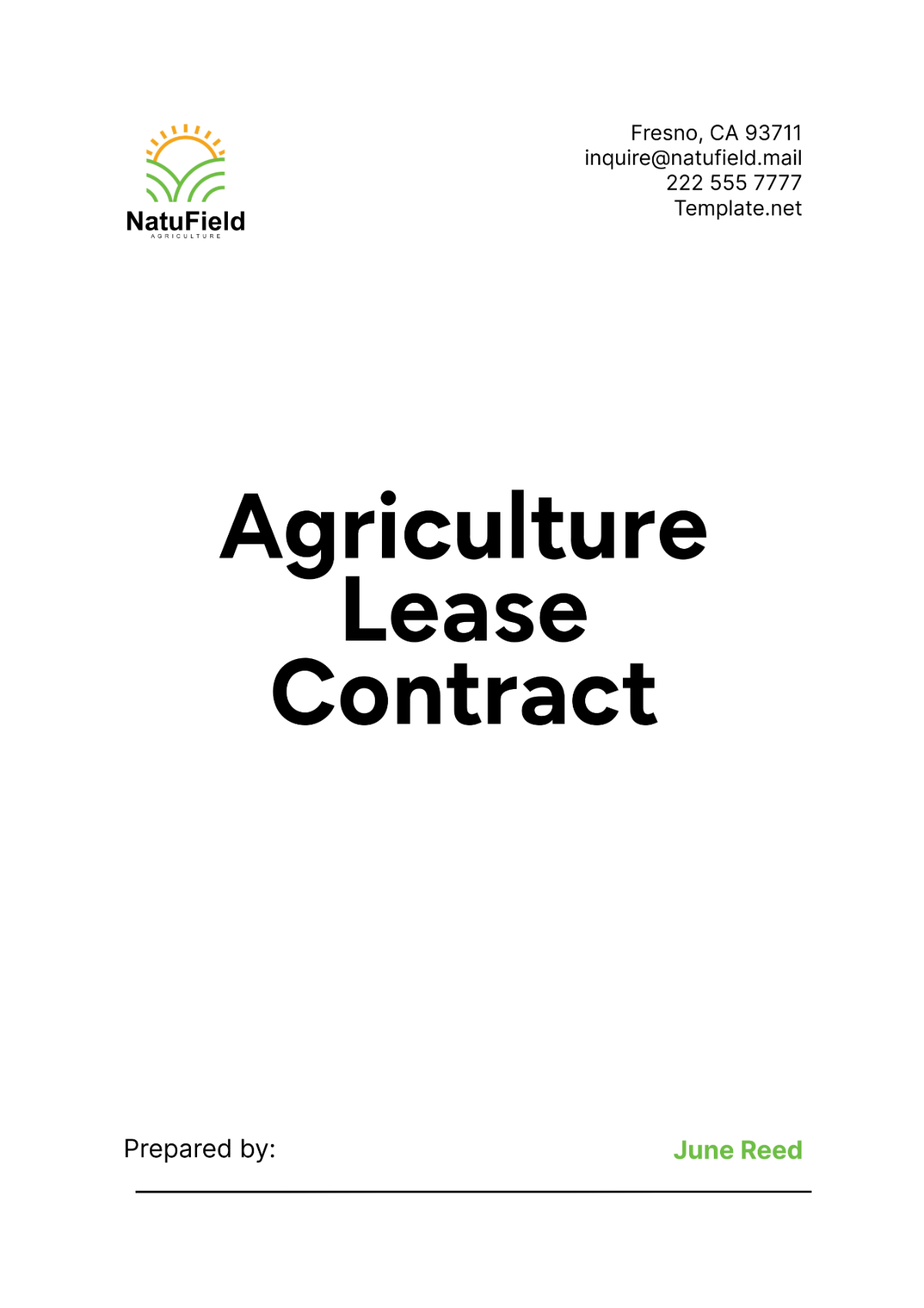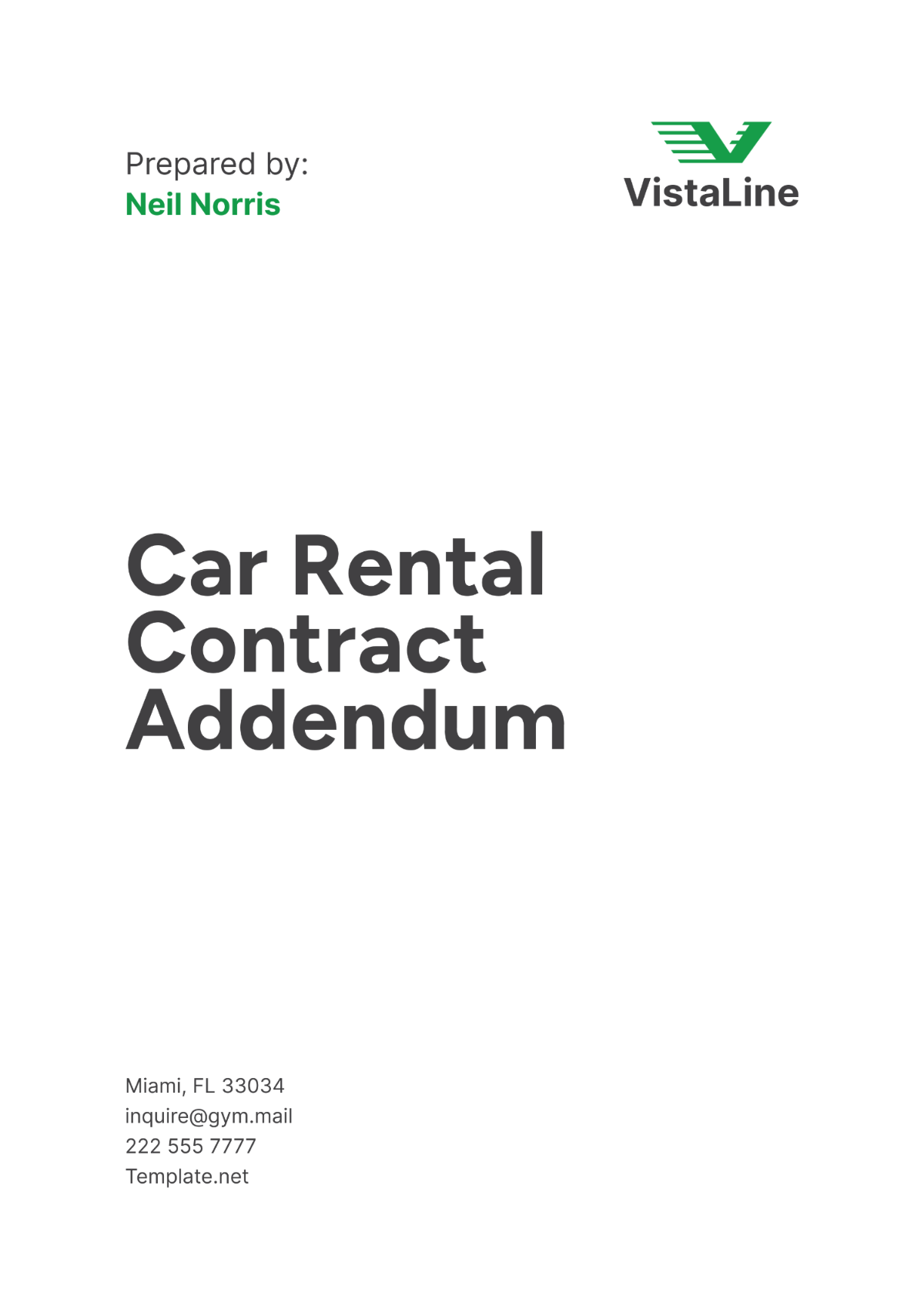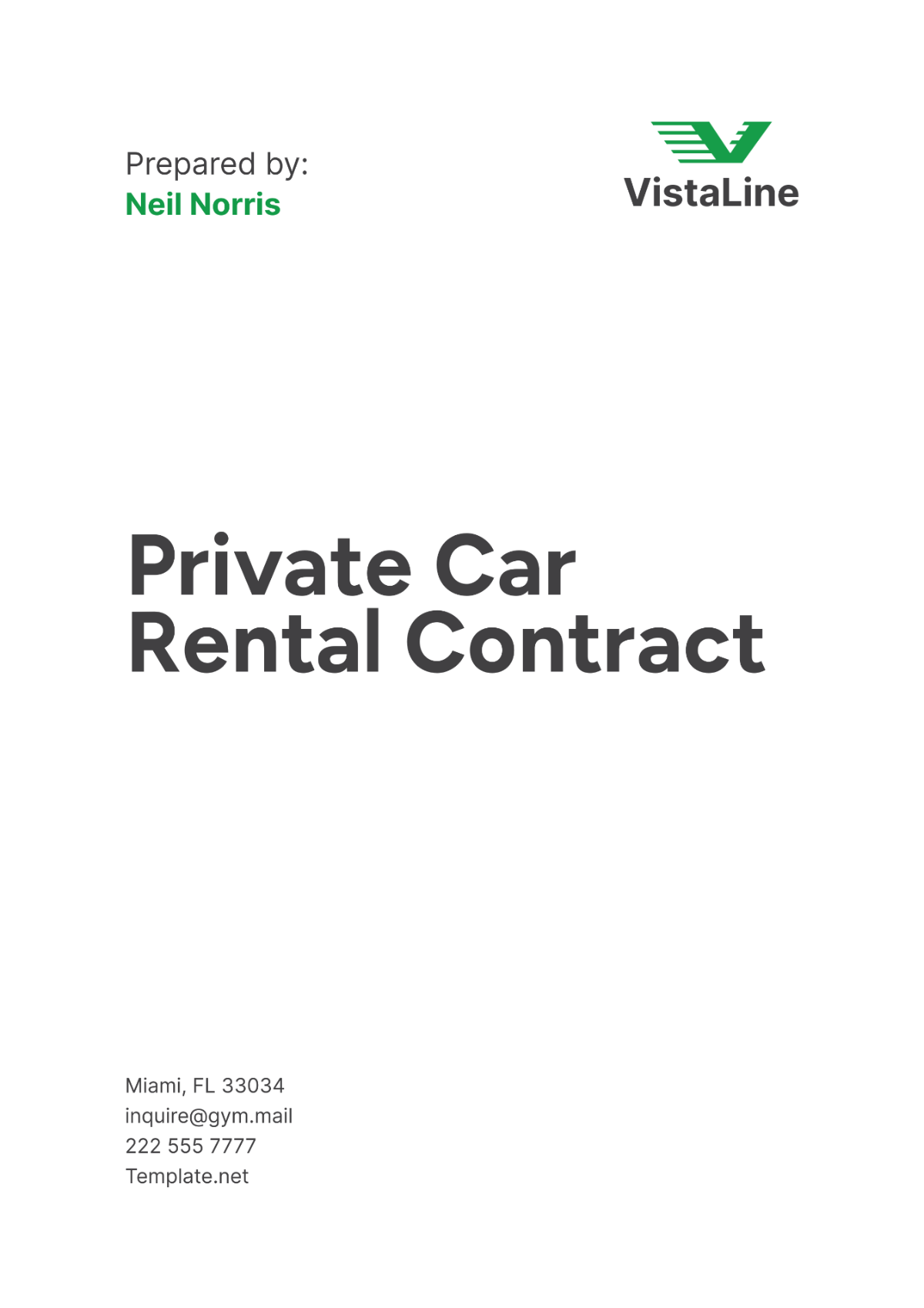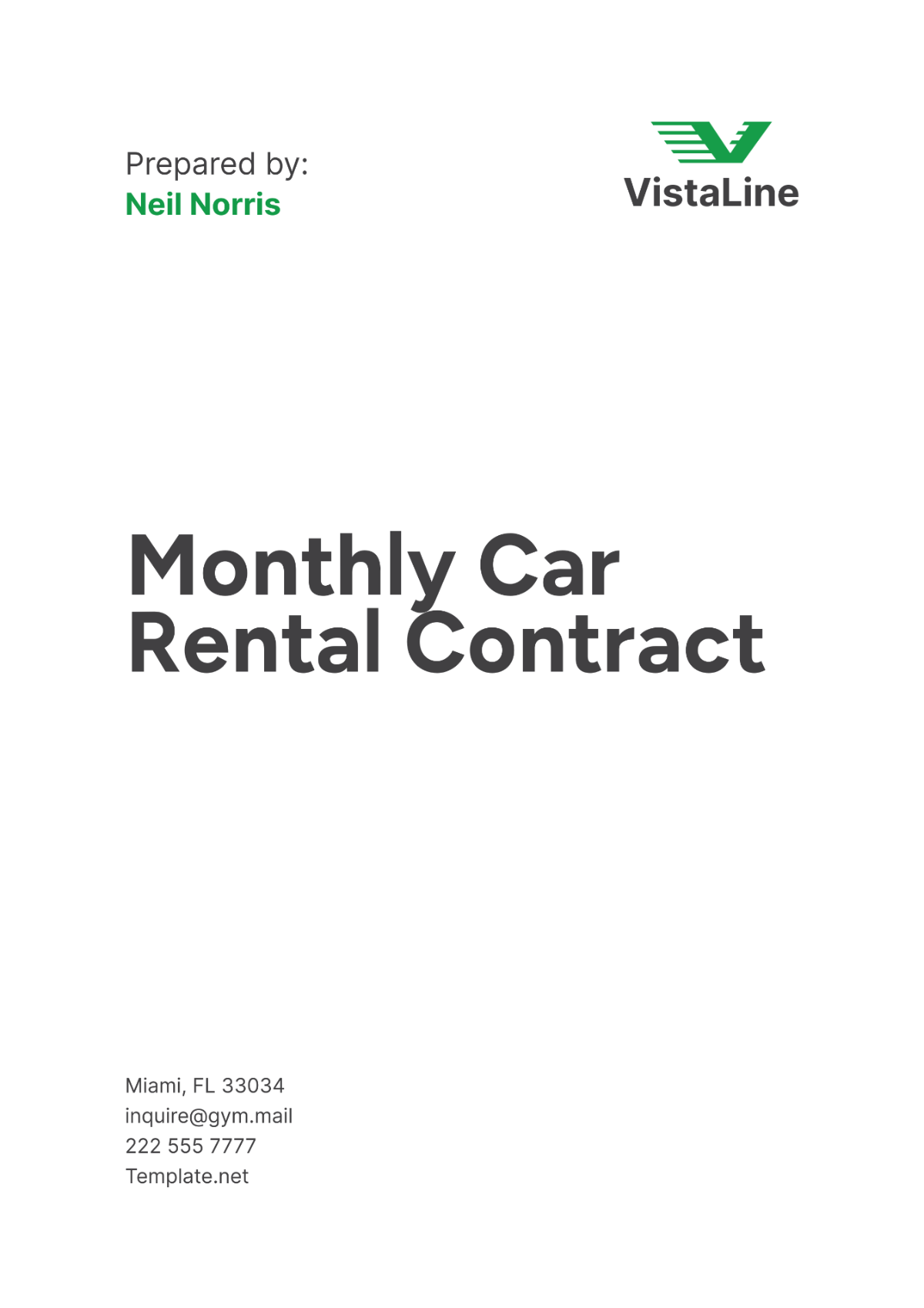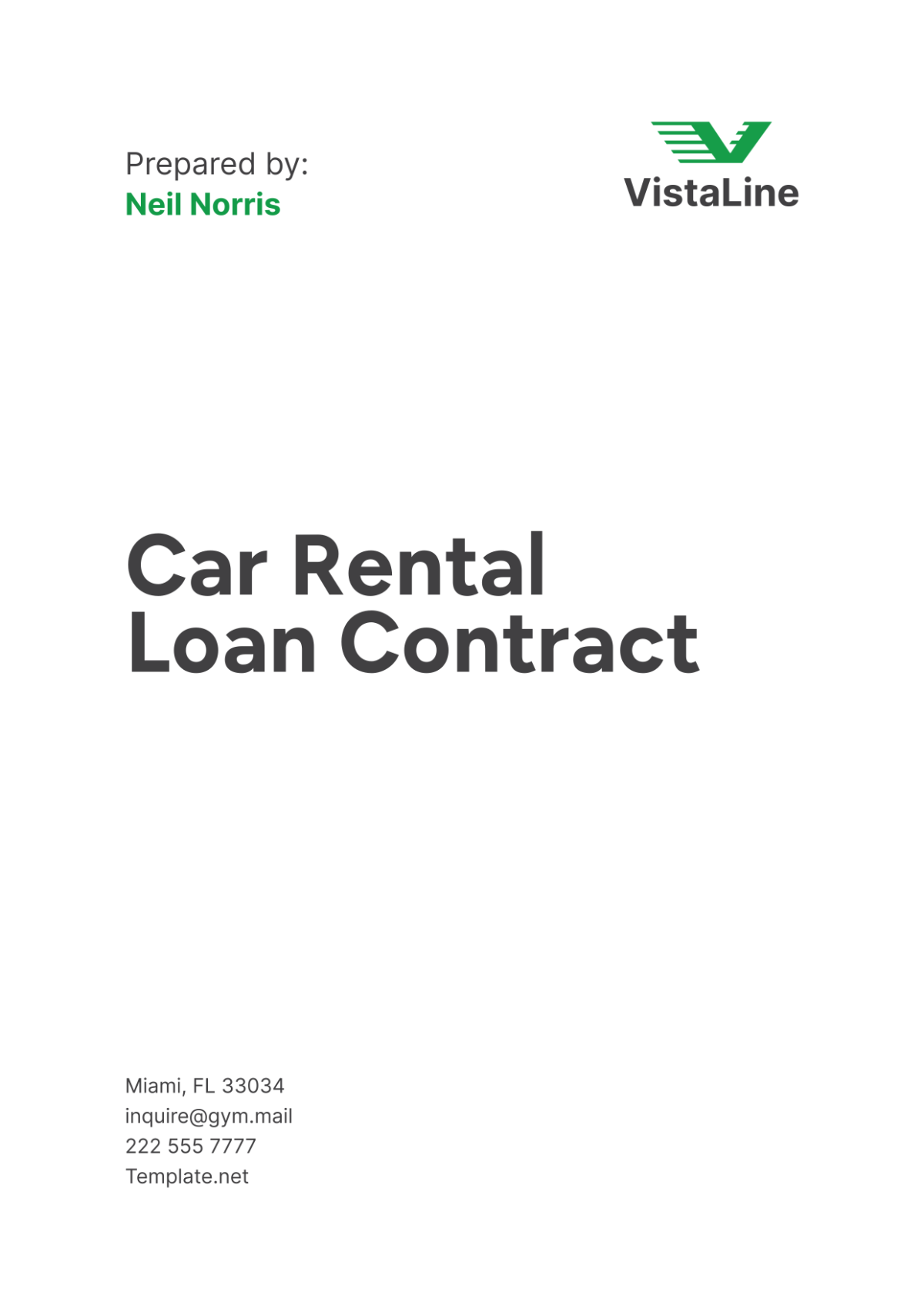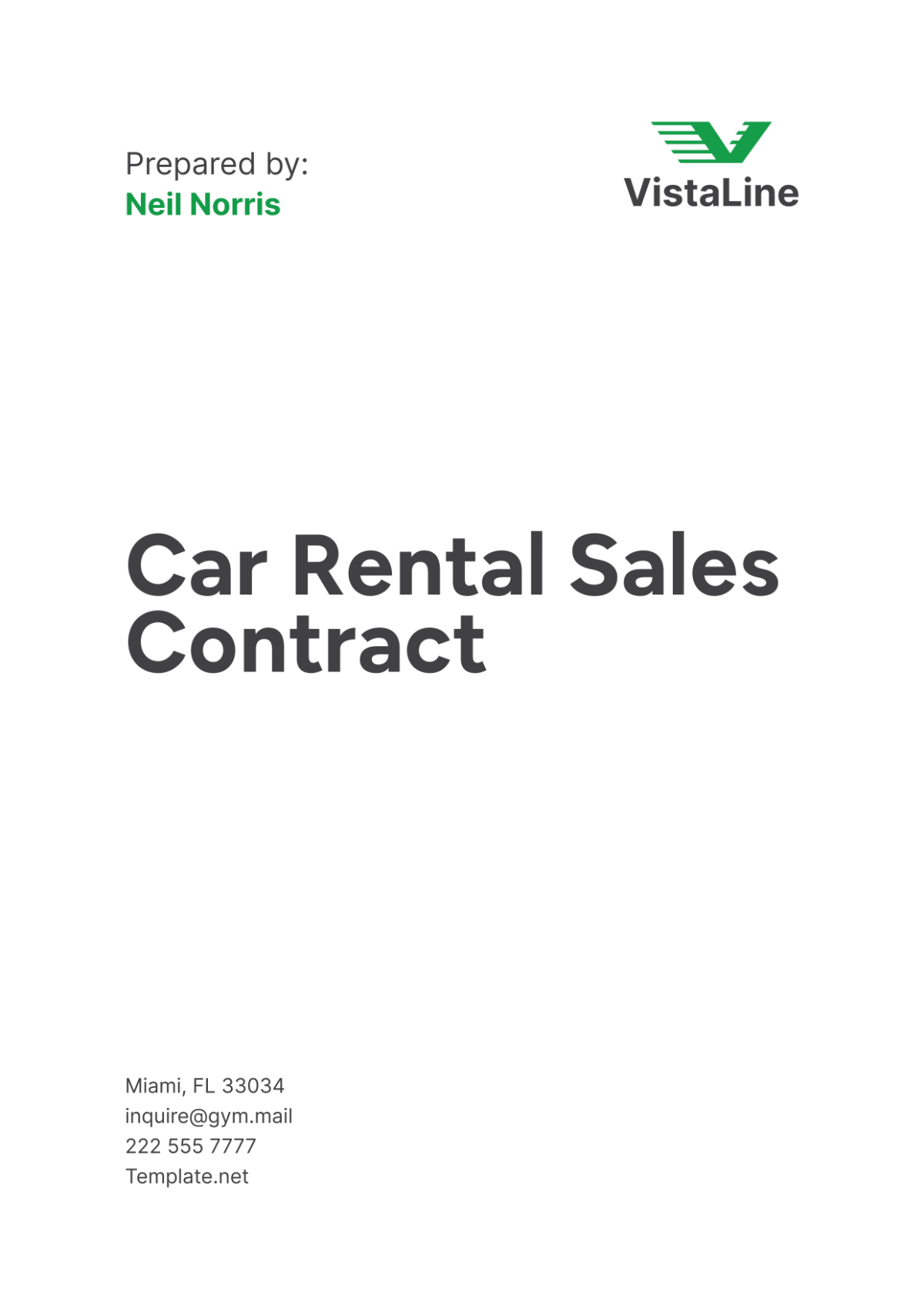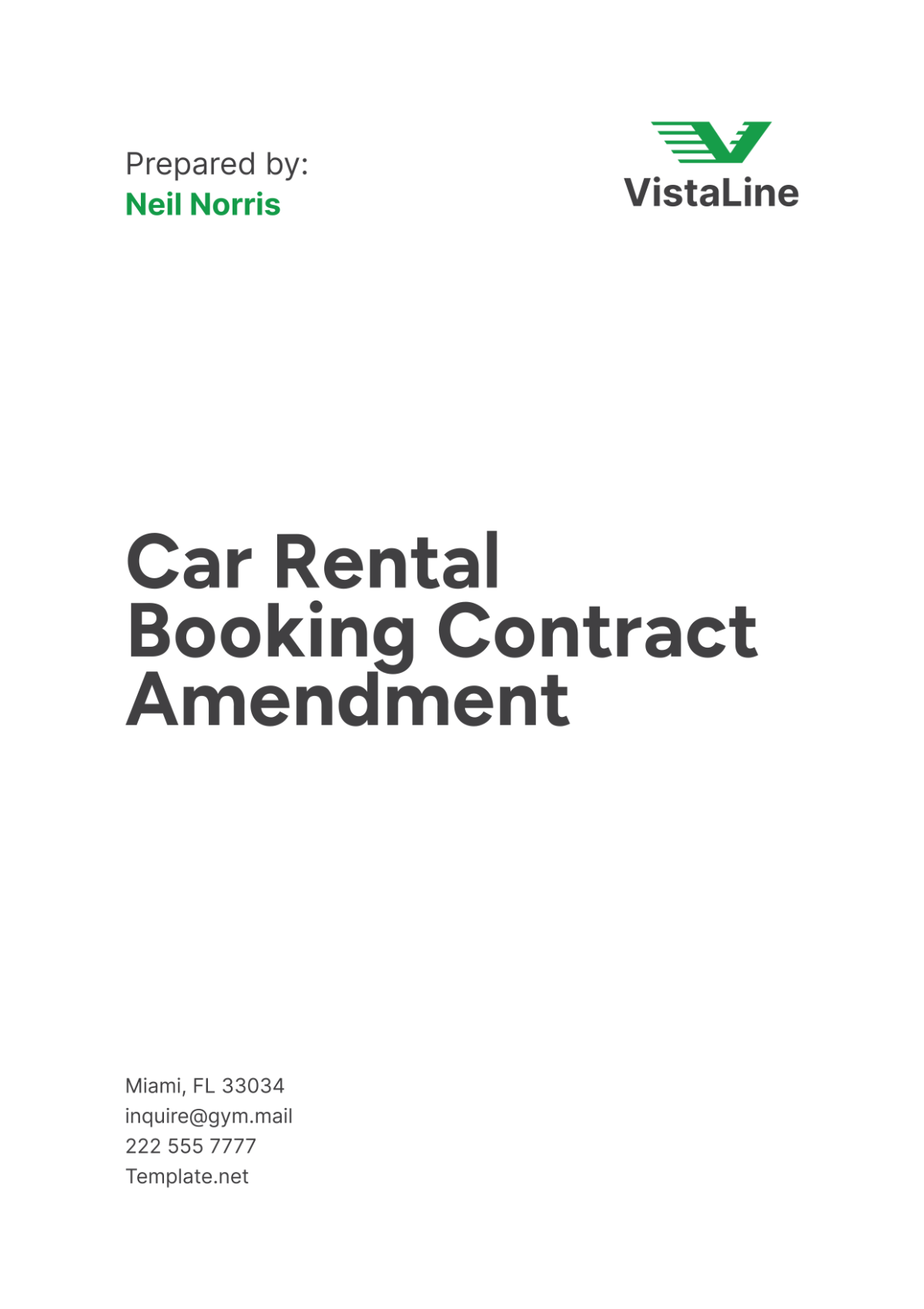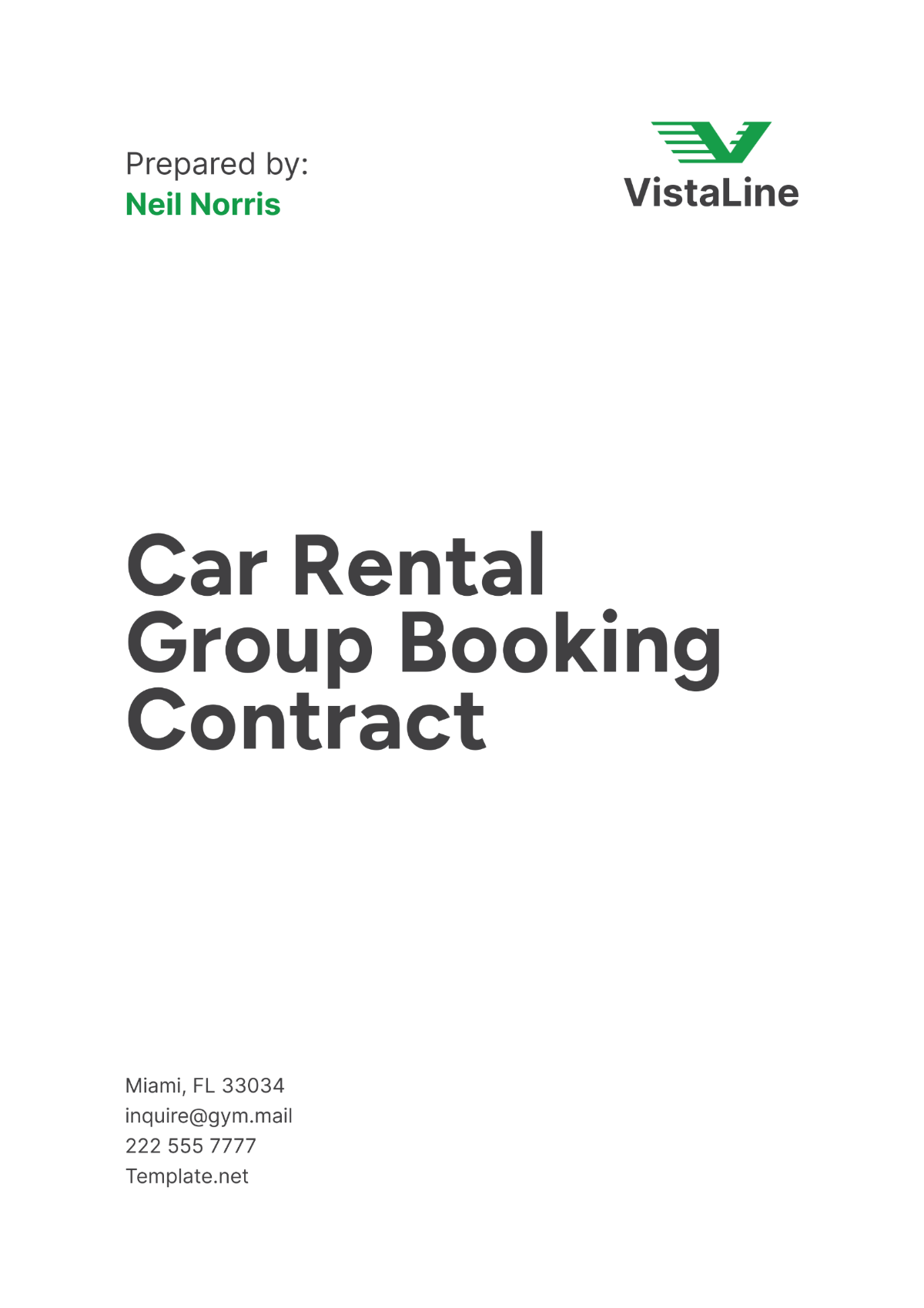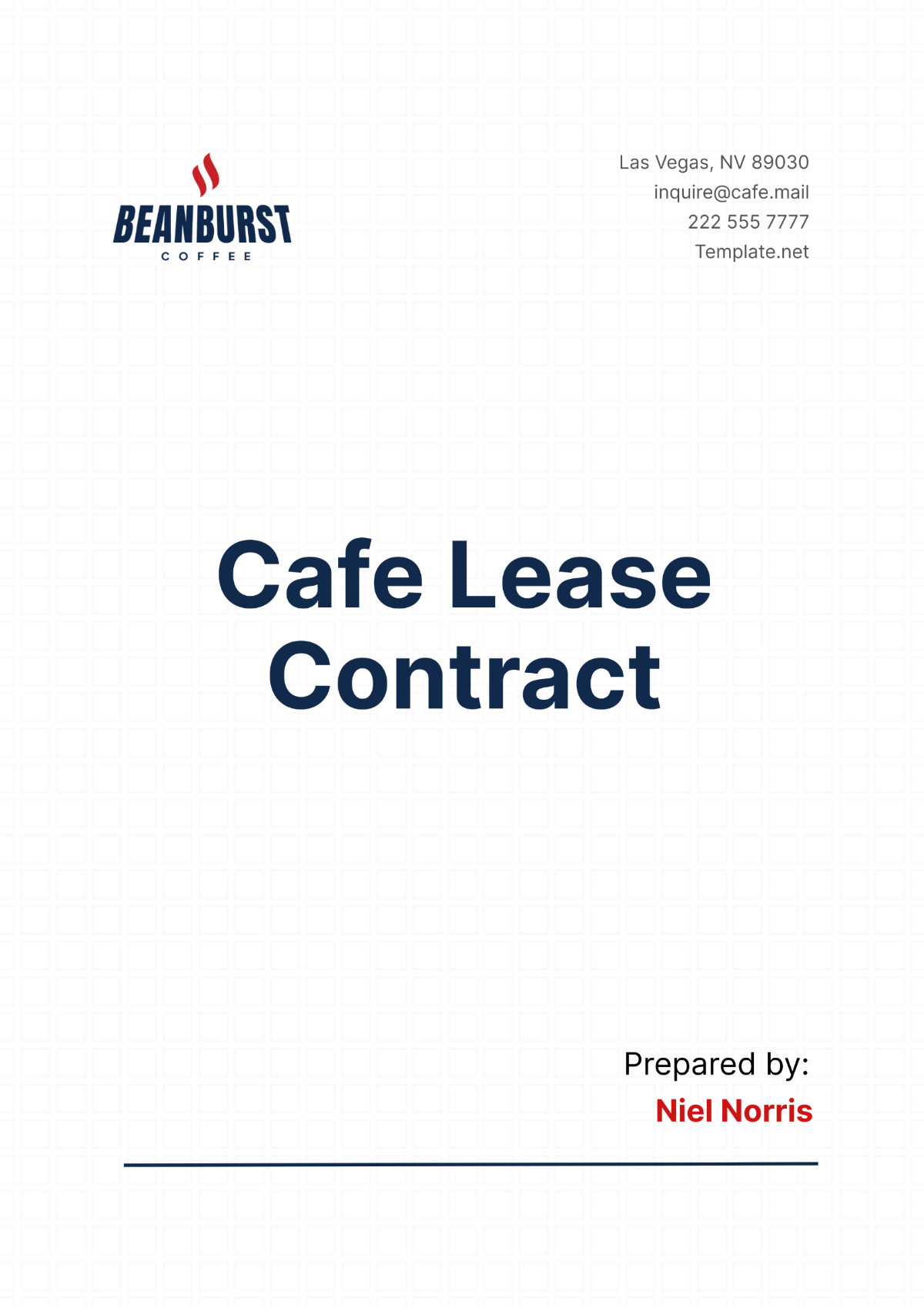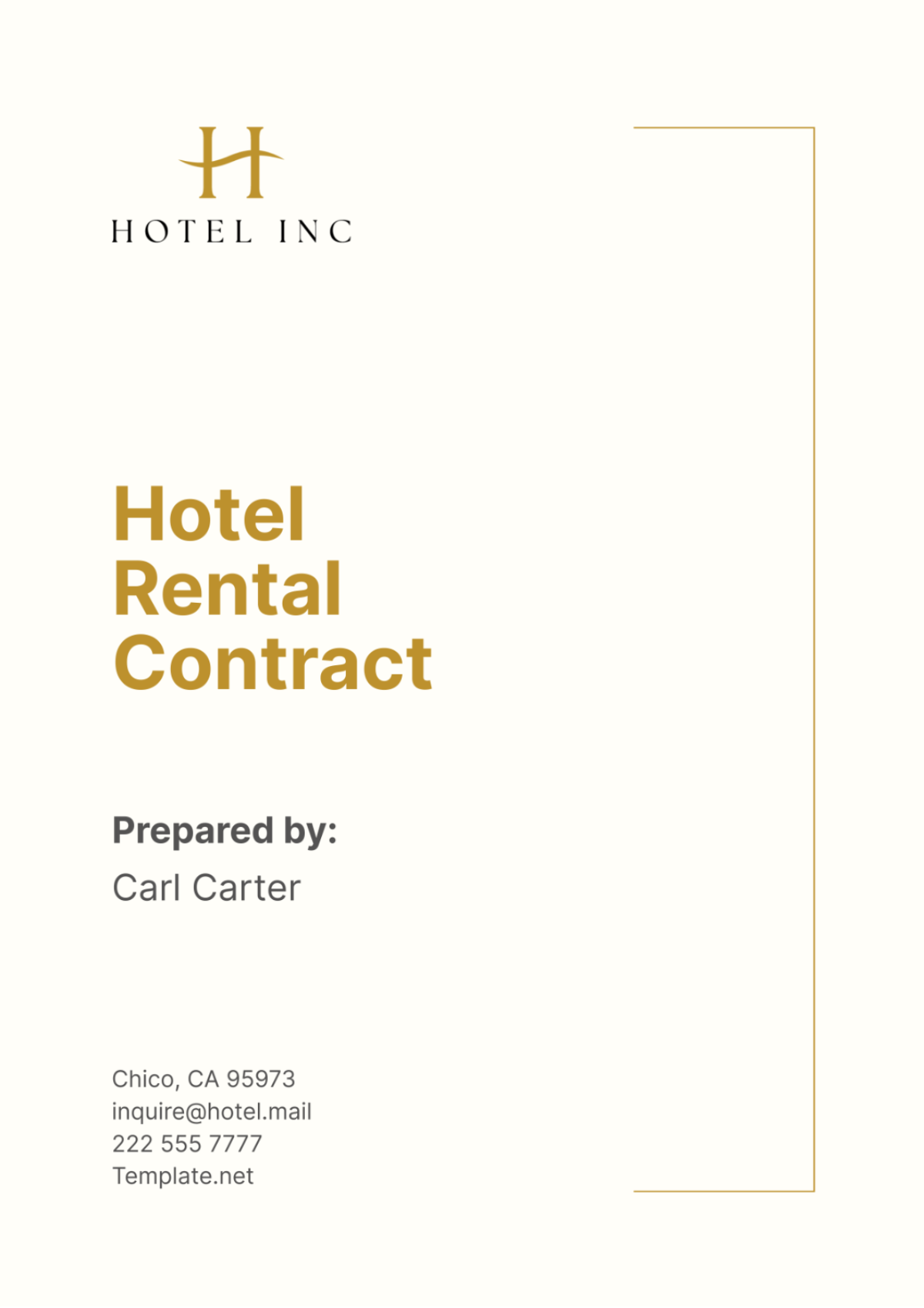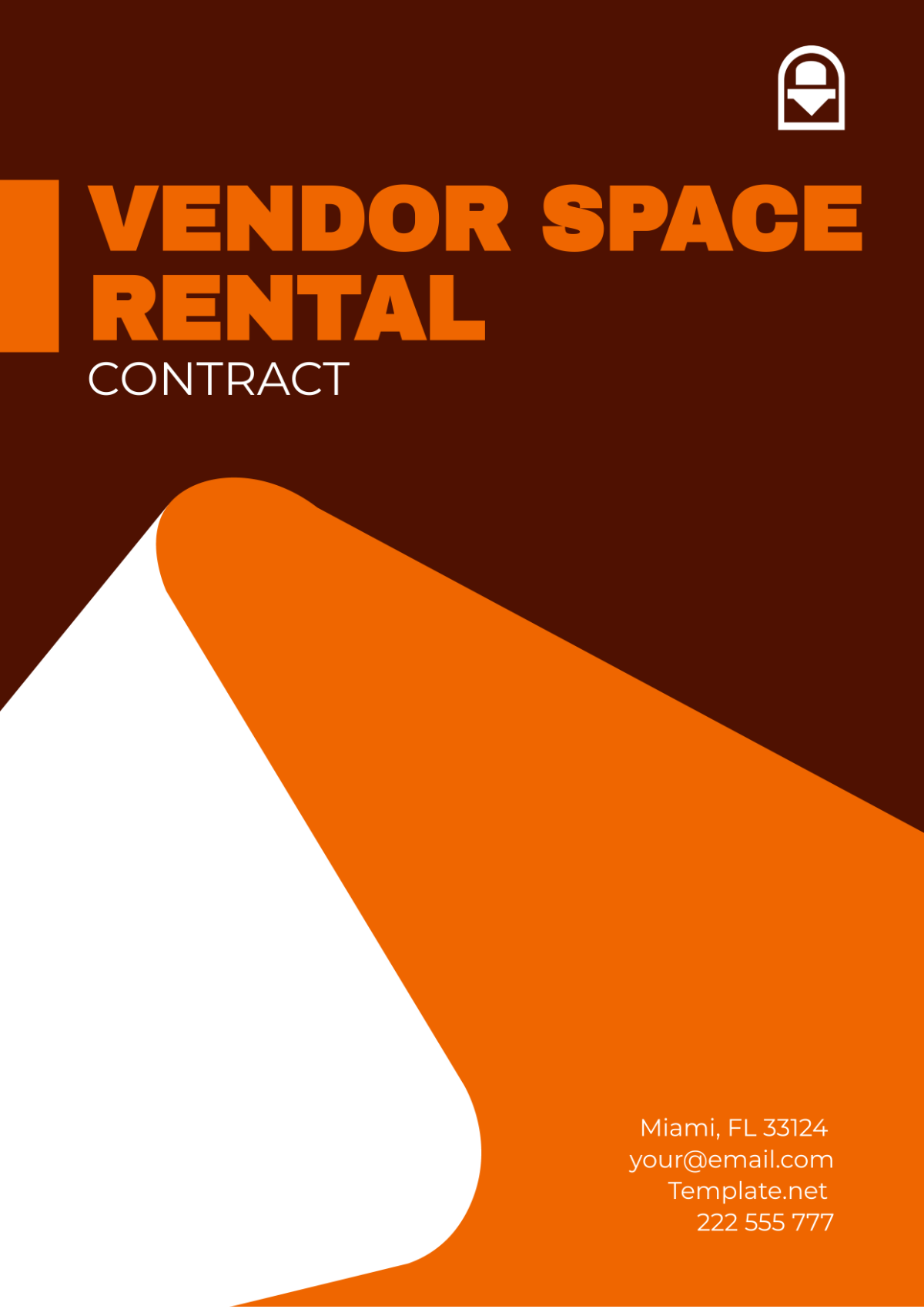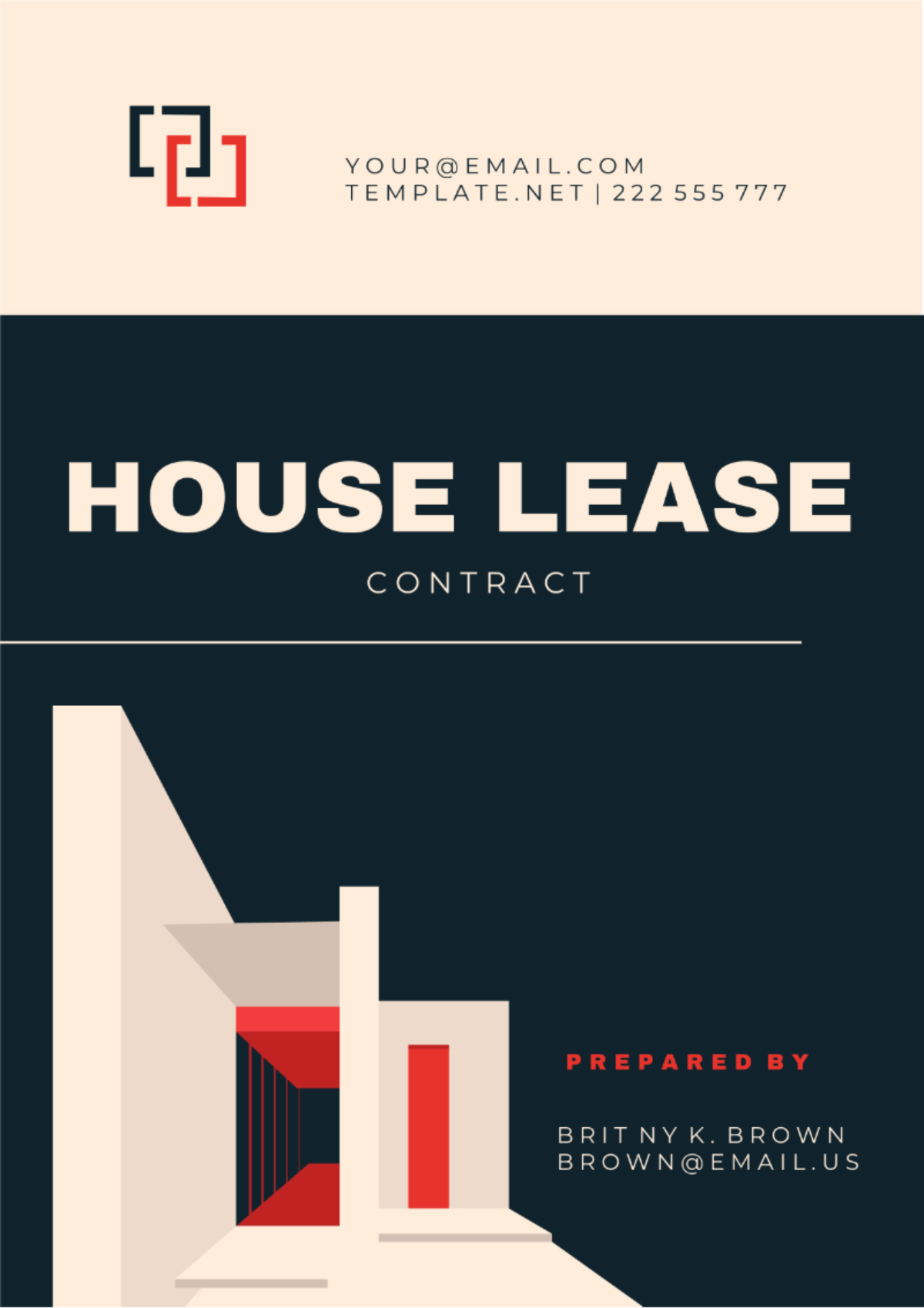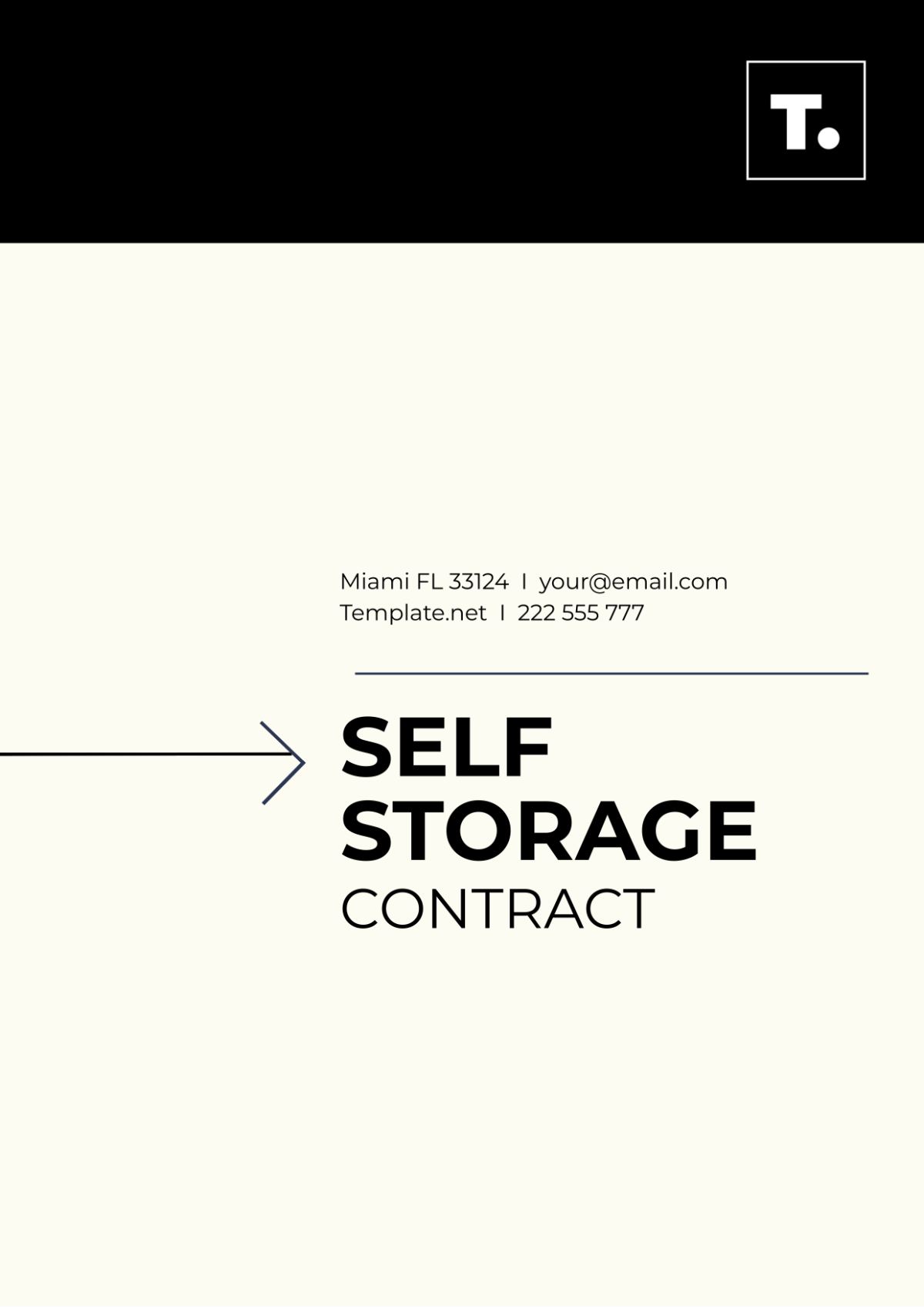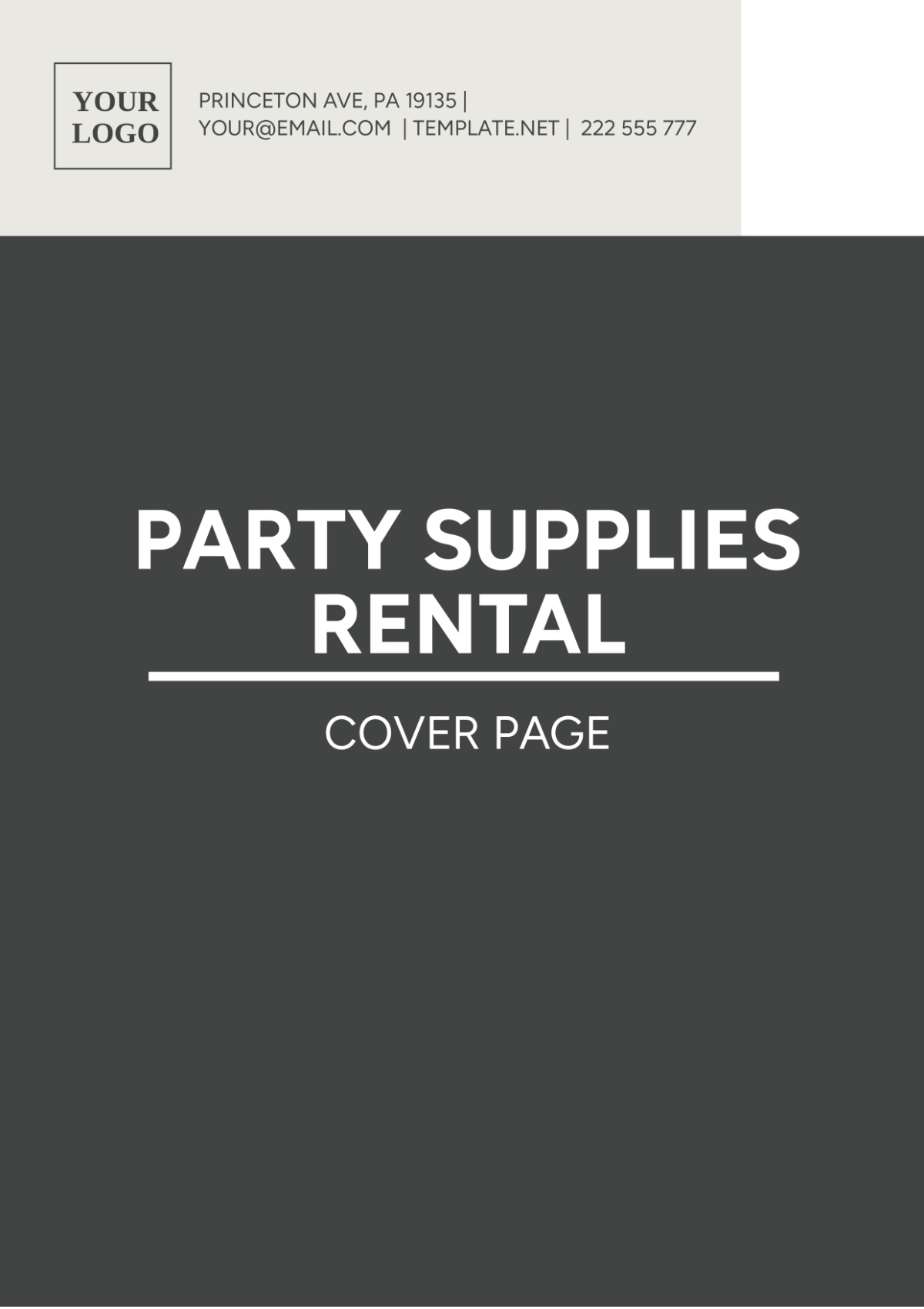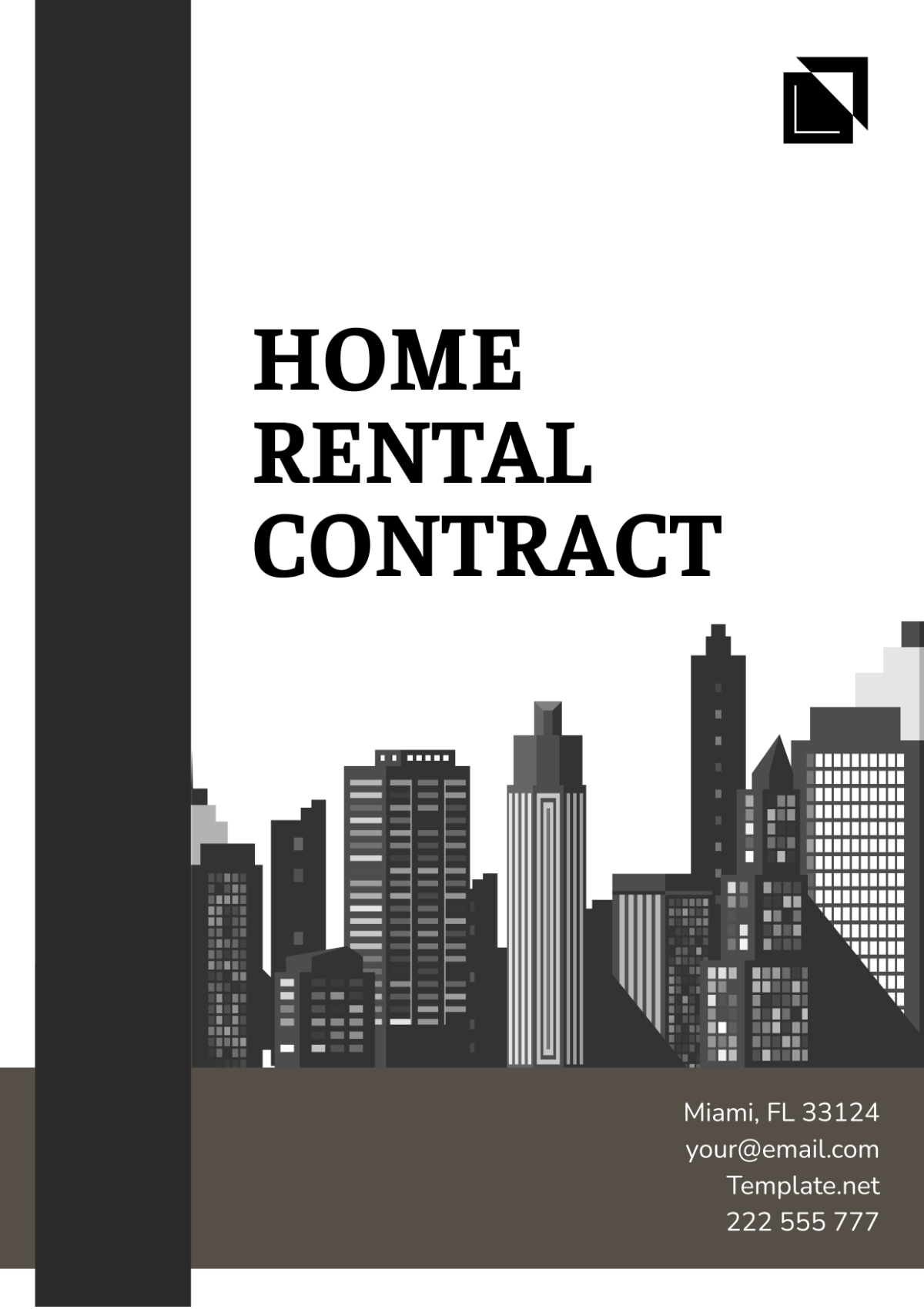Cafe Lease Contract
This Lease Contract (the "Lease") is made effective as of [Month Day, Year, by and between:
Tenant: [Your Name], [Your Company Address], [City, State, Zip], [Your Company Number], [Your Company Email]
and
Landlord: [Landlord's Name], [Landlord's Address], [City, State, Zip], [Landlord's Number], [Landlord's Email]
Property: The premises located at [Property Address], including all fixtures, furnishings, and equipment therein.
1. Term of Lease
1.1 Commencement Date
The Lease shall commence on [Month Day, Year] (the "Commencement Date"). This date marks the beginning of the Tenant's right to occupy the premises and the start of their obligations under this Lease. The Tenant is expected to take possession of the premises on this date.
1.2 Lease Term
The Lease shall continue for a period of [0] months (the "Lease Term"), ending on [Month Day, Year] (the "Expiration Date"). This Lease Term defines the fixed period during which the Tenant is entitled to occupy the premises. The Tenant is obligated to pay rent and fulfill all other lease obligations throughout this period, barring any early termination as stipulated in this Lease.
1.3 Renewal Option
1.3.1 Upon the expiration of the Lease Term, the Tenant shall have the option to renew the Lease for an additional term of [0] months. This option provides the Tenant with the opportunity to extend their tenancy under mutually agreed-upon terms.
1.3.2 The renewal shall be subject to mutual agreement on the rental rate and other terms. Both parties must negotiate and agree on the conditions for the renewal, including any changes to the rent amount and lease provisions.
1.3.3 The Tenant must provide written notice to the Landlord of their intention to renew no later than [0] days prior to the Expiration Date. This notice period ensures that both parties have adequate time to negotiate and finalize the terms of the renewal. Failure to provide timely notice may result in the loss of the renewal option.
1.4 Holdover Tenancy
1.4.1 If the Tenant remains in possession of the premises after the Expiration Date without a formal extension or renewal of this Lease, such occupancy shall be deemed a month-to-month tenancy. This means that the Tenant continues to occupy the premises on a month-to-month basis, governed by the original terms of this Lease.
1.4.2 The month-to-month tenancy shall be subject to all provisions of this Lease, except that the monthly rent shall be increased to $[0] or an amount agreed upon in writing by both parties. The increased rent reflects the temporary nature of the month-to-month arrangement and provides flexibility for both parties.
1.4.3 Either party may terminate the month-to-month tenancy by providing the other party with at least [0] days' written notice. This notice period allows either the Landlord or the Tenant to end the tenancy with adequate time to make necessary arrangements, ensuring a smooth transition for both parties.
2. Rent
2.1 Monthly Rent
The Tenant shall pay the Landlord a monthly rent of $[0] per month (the "Rent"), payable in advance on the first day of each month. This amount constitutes the basic rent for the use and occupancy of the premises and is exclusive of any other charges such as utilities, maintenance, or additional services, unless otherwise specified in this Lease.
2.2 Payment Method
2.2.1 Rent payments shall be made by [electronic transfer].
2.2.2 Payments shall be directed to the Landlord's designated account at [Bank Name], Account Number [Account Number]. It is the Tenant's responsibility to ensure that payments are made to the correct account and received by the Landlord on or before the due date.
2.3 Late Payments
2.3.1 If the Rent is not received by the Landlord by the [15th] day of the month, the Tenant shall incur a late fee of $[0]. This late fee is intended to cover the inconvenience and administrative costs associated with late payments.
2.3.2 Continual late payment may be considered a breach of this Lease, subjecting the Tenant to possible eviction and other legal remedies. The Landlord reserves the right to issue a notice of default if Rent is consistently late.
2.4 Insufficient Funds
2.4.1 If a Rent payment is returned due to insufficient funds, the Tenant shall be responsible for an additional fee of $[0]. This fee covers the bank charges and administrative costs incurred by the Landlord.
2.4.2 The Tenant must provide an alternative payment method immediately upon notification of the returned payment. Repeated incidents of insufficient funds may result in the requirement for the Tenant to pay Rent in certified funds.
2.5 Rent Increases
2.5.1 The Landlord reserves the right to increase the Rent upon renewal of the Lease or during a holdover tenancy. Rent increases will reflect market conditions, inflation, and the operational costs of maintaining the premises.
2.5.2 The Landlord must provide the Tenant with at least [0] days' written notice of any Rent increase. This notice period ensures that the Tenant has sufficient time to plan for the increased expense or to negotiate terms.
2.6 Application of Payments
Payments received from the Tenant shall be applied in the following order:
2.6.1 First, to any outstanding late fees or penalties, ensuring that administrative costs are covered.
2.6.2 Second, to any past due Rent, addressing any arrears.
2.6.3 Third, to the current Rent, maintaining the Tenant's account in good standing.
2.7 Prorated Rent
If the Lease commences on a day other than the first day of a month, the Rent for that partial month shall be prorated on a daily basis, calculated as 1/30th of the monthly Rent per day. The prorated Rent shall be due on the Commencement Date. This ensures that the Tenant only pays for the actual days of occupancy.
2.8 Security Deposit
The Security Deposit referenced in Section 3 shall not be applied to the last month’s Rent unless agreed in writing by the Landlord. The Security Deposit is intended to cover damages or unpaid obligations and should not be used as a substitute for the last month's Rent. Any agreement to use the Security Deposit for this purpose must be documented in writing.
3. Security Deposit
3.1 Amount and Purpose
Upon signing this Lease, the Tenant shall provide a security deposit of $[0] (the "Security Deposit") to be held by the Landlord. The Security Deposit serves as security for the performance of the Tenant's obligations under this Lease, including but not limited to the payment of rent, repair of damages, and fulfillment of any other financial obligations.
3.2 Deposit Payment
3.2.1 The Security Deposit shall be paid to the Landlord on or before the Commencement Date.
3.2.2 The payment method for the Security Deposit shall be [electronic transfer], directed to the Landlord's designated account at [Bank Name], Account Number [Account Number].
3.3 Use of Security Deposit
3.3.1 The Landlord may apply the Security Deposit, or any portion thereof, to cover any unpaid rent or other charges due under this Lease.
3.3.2 The Security Deposit may also be used to cover the cost of repairing any damages to the premises beyond normal wear and tear caused by the Tenant, their agents, or invitees.
3.3.3 The Security Deposit may not be used by the Tenant as a substitute for rent payment for any month during the Lease Term, except as provided in this Lease.
3.4 Return of Security Deposit
3.4.1 Within [0] days after the termination or expiration of this Lease, the Landlord shall return the Security Deposit to the Tenant, less any deductions for damages, unpaid rent, or other charges as provided in this Lease.
3.4.2 The Landlord shall provide the Tenant with an itemized statement detailing any deductions made from the Security Deposit.
3.5 Interest on Security Deposit
3.5.1 In accordance with state law, the Security Deposit shall be held in an interest-bearing account. The Landlord shall retain any interest earned on the Security Deposit unless otherwise required by law.
3.5.2 If state law requires interest to be paid to the Tenant, the Landlord shall comply with such requirements and provide the Tenant with the interest accrued on the Security Deposit.
3.6 Disputes
3.6.1 Any disputes regarding the return or use of the Security Deposit shall be resolved in accordance with state law. The Tenant may seek legal remedies if the Security Deposit is not returned in a timely manner or if the Tenant disputes the deductions made by the Landlord.
3.6.2 The Landlord and Tenant are encouraged to resolve any disputes amicably and may consider mediation as an alternative to litigation.
3.7 Additional Security Deposit
3.7.1 If the Tenant violates any terms of this Lease that result in additional financial liability, the Landlord may require the Tenant to replenish the Security Deposit to its original amount.
3.7.2 The Tenant shall provide the additional Security Deposit within [0] days of receiving written notice from the Landlord.
4. Use of Premises
4.1 Permitted Use
The Tenant shall use the premises solely for the operation of a cafe (the "Permitted Use") and for no other purpose without the Landlord's prior written consent. This restriction ensures that the premises are used in a manner consistent with the Landlord's expectations and the property's zoning regulations.
4.2 Compliance with Laws
4.2.1 The Tenant agrees to comply with all applicable federal, state, and local laws, regulations, and ordinances relating to the use of the premises. This includes, but is not limited to, health and safety codes, fire regulations, and zoning laws.
4.2.2 The Tenant shall obtain and maintain all necessary permits, licenses, and approvals required for the operation of the cafe. This includes health department permits, business licenses, and any other regulatory approvals necessary for lawful operation.
4.3 Alterations and Improvements
4.3.1 The Tenant shall not make any alterations, improvements, or additions to the premises without the prior written consent of the Landlord. This includes any structural changes, modifications to the layout, or installation of fixtures.
4.3.2 Any alterations, improvements, or additions made by the Tenant shall be at the Tenant's expense and shall become the property of the Landlord upon termination of this Lease, unless otherwise agreed in writing by both parties.
4.3.3 The Tenant shall restore the premises to its original condition, except for ordinary wear and tear, upon the expiration or termination of this Lease, unless the Landlord agrees in writing to retain the alterations or improvements.
4.4 Maintenance and Repairs
4.4.1 The Tenant shall maintain the premises in a clean, sanitary, and safe condition at all times. This includes regular cleaning, trash removal, and adherence to health and safety standards.
4.4.2 The Tenant shall be responsible for all routine maintenance and minor repairs necessary to keep the premises in good condition. This includes maintenance of fixtures, equipment, and any tenant-installed improvements.
4.4.3 The Landlord shall be responsible for major structural repairs, unless such repairs are necessitated by the negligence or misuse of the Tenant, in which case the Tenant shall bear the cost.
4.5 Prohibited Uses
4.5.1 The Tenant shall not use or permit the premises to be used for any unlawful purpose or in any manner that would void the insurance coverage on the premises or increase the insurance premium rates.
4.5.2 The Tenant shall not create or permit any nuisance, waste, or disturbance on the premises that would interfere with the rights, comfort, or safety of the Landlord or other tenants.
4.6 Signage
4.6.1 The Tenant may install signage on the premises in accordance with the Landlord's signage guidelines and local zoning regulations, subject to the prior written approval of the Landlord.
4.6.2 The Tenant shall be responsible for all costs associated with the installation, maintenance, and removal of signage. The Tenant shall repair any damage to the premises resulting from the removal of signage.
4.7 Subletting and Assignment
4.7.1 The Tenant shall not sublet the premises or assign this Lease, in whole or in part, without the prior written consent of the Landlord. Any attempt to sublet or assign without such consent shall be void and may result in termination of this Lease.
4.7.2 The Landlord's consent to any subletting or assignment shall not be unreasonably withheld, provided that the proposed subtenant or assignee meets the Landlord's standard credit and business qualifications.
5. Maintenance and Repairs
5.1 Tenant's Responsibilities
The Tenant shall be responsible for the maintenance and repair of the premises, including all fixtures, furnishings, and equipment, ensuring they are kept in good and sanitary condition, reasonable wear and tear excepted.
5.2 Routine Maintenance
5.2.1 The Tenant shall perform all routine maintenance necessary to keep the premises in good condition, including but not limited to cleaning, painting, and minor repairs. This responsibility ensures that the premises remain presentable and functional for the duration of the lease.
5.2.2 The Tenant shall promptly address any maintenance issues to prevent further damage or deterioration of the premises. This includes repairing leaks, replacing light bulbs, and maintaining plumbing and electrical systems.
5.3 Major Repairs
5.3.1 The Tenant shall notify the Landlord immediately of any major repairs needed that are beyond the Tenant's responsibility or capability. This includes structural repairs, major plumbing or electrical issues, and other significant repairs.
5.3.2 The Landlord shall be responsible for major structural repairs, unless such repairs are necessitated by the negligence or misuse of the Tenant, in which case the Tenant shall bear the cost. This provision ensures that the Landlord addresses major issues while holding the Tenant accountable for damages caused by their actions.
5.4 Equipment and Fixtures
5.4.1 The Tenant shall maintain and repair all equipment and fixtures installed by the Tenant or provided by the Landlord for the operation of the cafe. This includes kitchen appliances, HVAC systems, and any other equipment used in the Tenant's business.
5.4.2 The Tenant shall ensure that all equipment and fixtures are regularly serviced and kept in good working order. Failure to maintain equipment may result in additional repair costs and potential downtime for the Tenant's business.
5.5 Common Areas
5.5.1 The Tenant shall keep all common areas adjacent to the premises, such as hallways, restrooms, and entryways, clean and free of obstructions. This responsibility ensures a safe and pleasant environment for all tenants and customers.
5.5.2 The Landlord shall be responsible for the maintenance and repair of common areas not directly under the Tenant's control, ensuring that the overall property remains in good condition.
5.6 Pest Control
5.6.1 The Tenant shall take reasonable measures to prevent pest infestations, including maintaining cleanliness and properly storing food and waste. This proactive approach helps prevent issues that could disrupt the Tenant's business and damage the premises.
5.6.2 The Landlord shall arrange for regular pest control services, with the Tenant responsible for additional costs if an infestation is caused by the Tenant's negligence.
5.7 Inspection and Access
5.7.1 The Landlord reserves the right to inspect the premises with reasonable notice to the Tenant to ensure compliance with maintenance and repair obligations. Regular inspections help identify and address potential issues before they become major problems.
5.7.2 The Tenant shall provide the Landlord or their agents access to the premises for the purpose of making necessary repairs, maintenance, or improvements. Access must be coordinated to minimize disruption to the Tenant's business operations.
5.8 Restoration of Premises
5.8.1 Upon the termination or expiration of this Lease, the Tenant shall restore the premises to its original condition, reasonable wear and tear excepted. This includes repairing any damage caused by the Tenant and removing all personal property.
5.8.2 Any alterations or improvements made by the Tenant with the Landlord's consent that are not removed shall become the property of the Landlord, unless otherwise agreed in writing.
6. Insurance
6.1 General Liability Insurance
The Tenant shall maintain general liability insurance covering the premises and its operations, with minimum coverage of $[0]. This insurance coverage protects the Tenant and the Landlord from liability claims arising from injuries or damages that occur on the premises.
6.2 Proof of Insurance
6.2.1 The Tenant shall provide proof of insurance to the Landlord upon request. This proof typically includes a certificate of insurance issued by the Tenant's insurance provider, detailing the coverage amount, policy period, and other relevant information.
6.2.2 The Tenant shall ensure that the Landlord is listed as an additional insured on the insurance policy. This provides the Landlord with coverage under the Tenant's policy for claims related to the premises.
6.3 Insurance Policy Requirements
6.3.1 The insurance policy shall be issued by a reputable insurance company licensed to do business in the state where the premises are located.
6.3.2 The insurance policy shall name the Landlord as an additional insured and provide a waiver of subrogation in favor of the Landlord. This ensures that the Landlord is protected against claims and that the insurance company waives its right to seek reimbursement from the Landlord for any claims paid under the policy.
6.3.3 The insurance policy shall include a provision stating that it cannot be canceled or materially altered without at least 30 days' prior written notice to the Landlord. This ensures that the Landlord is informed of any changes to the insurance coverage and has an opportunity to take appropriate action.
6.4 Renewal and Continuation
The Tenant shall ensure that the insurance policy is renewed and continued in force for the duration of the Lease Term. Failure to maintain insurance coverage as required may be considered a material breach of this Lease.
6.5 Failure to Maintain Insurance
If the Tenant fails to maintain the required insurance coverage, the Landlord may, at its option, obtain insurance coverage on behalf of the Tenant. The cost of such insurance shall be reimbursed by the Tenant to the Landlord upon demand.
6.6 Indemnification
6.6.1 The Tenant agrees to indemnify, defend, and hold harmless the Landlord from and against any and all claims, liabilities, damages, losses, and expenses, including but not limited to attorney's fees, arising out of or in connection with the Tenant's use or occupancy of the premises.
6.6.2 This indemnification provision ensures that the Tenant is responsible for any damages or liabilities arising from their use of the premises, even if covered by insurance.
7. Indemnification
7.1 Tenant's Indemnification
The Tenant shall indemnify and hold harmless the Landlord from and against any and all claims, damages, liabilities, and expenses, including but not limited to attorney's fees, arising out of or in connection with the Tenant's use of the premises.
7.2 Scope of Indemnification
7.2.1 This indemnification includes, but is not limited to, claims for personal injury, property damage, or other losses arising from the Tenant's negligence, willful misconduct, or breach of this Lease.
7.2.2 The Tenant's obligation to indemnify the Landlord shall survive the termination or expiration of this Lease, continuing until all claims and liabilities covered by this indemnification have been resolved.
7.3 Notice and Defense of Claims
7.3.1 The Landlord shall promptly notify the Tenant in writing of any claims, damages, liabilities, or expenses for which the Landlord seeks indemnification under this Lease.
7.3.2 The Tenant shall have the right to assume the defense of any such claim with counsel of its choice, provided that the Landlord is promptly notified of the assumption of defense. The Landlord shall have the right to participate in the defense at its own expense.
7.4 Settlement of Claims
7.4.1 The Tenant shall not settle or compromise any claim for which indemnification is sought under this Lease without the Landlord's prior written consent, which shall not be unreasonably withheld.
7.4.2 The Landlord shall not settle or compromise any claim without the Tenant's consent, which shall not be unreasonably withheld.
7.5 Limitation of Liability
Nothing in this indemnification provision shall limit the Landlord's right to recover damages or other remedies available at law or in equity for the Tenant's breach of this Lease or other obligations under applicable law.
7.6 Insurance Coverage
The Tenant's indemnification obligations under this section shall not be limited or affected by any insurance coverage maintained by the Tenant, including but not limited to general liability insurance.
8. Default
8.1 Payment Default
If the Tenant fails to pay rent when due, the Landlord may, at its option, terminate this Lease and evict the Tenant from the premises. This provision ensures that the Landlord has recourse in the event of non-payment of rent, protecting their financial interests.
8.2 Breach of Lease
8.2.1 If the Tenant breaches any material provision of this Lease other than non-payment of rent, and such breach is not cured within [0] days after written notice from the Landlord, the Landlord may terminate the Lease and evict the Tenant from the premises.
8.2.2 Material breaches of the Lease include, but are not limited to, violations of the permitted use, failure to maintain insurance, and failure to comply with laws and regulations applicable to the premises.
8.3 Notice of Default
Before terminating the Lease for default, the Landlord shall provide the Tenant with written notice specifying the nature of the default and the action required to cure the default. This notice gives the Tenant an opportunity to remedy the breach and avoid eviction.
8.4 Remedies
If the Lease is terminated due to default by the Tenant, the Landlord may pursue any remedies available at law or in equity, including but not limited to eviction, recovery of unpaid rent, and damages for breach of the Lease.
8.5 Holding Over
If the Tenant remains in possession of the premises after the expiration or termination of the Lease without the Landlord's consent, the Tenant shall be considered a holdover tenant. In such case, the Tenant shall be liable for double the monthly rent for each month or part thereof that the Tenant remains in possession.
8.6 Abandonment
If the Tenant abandons the premises before the expiration of the Lease Term, the Landlord may, at its option, terminate the Lease and take possession of the premises. The Tenant shall remain liable for rent and other obligations under the Lease until the premises are relet or the Lease Term expires.
9. Governing Law
This Lease shall be governed by and construed in accordance with the laws of the State of [State].
IN WITNESS WHEREOF, the parties have executed this Lease as of the date first above written.
Tenant:

[Your Name]
Landlord:

[Full Name]
